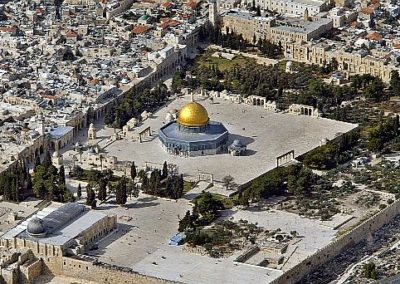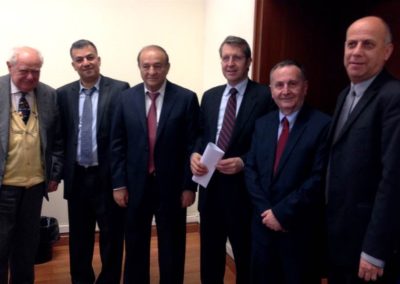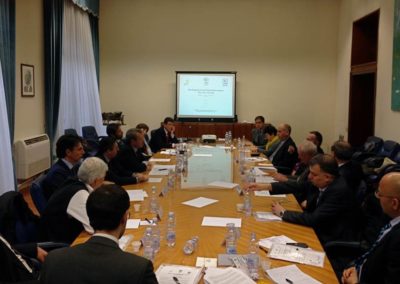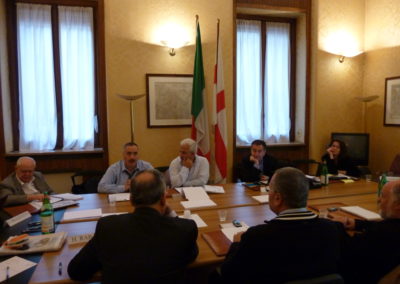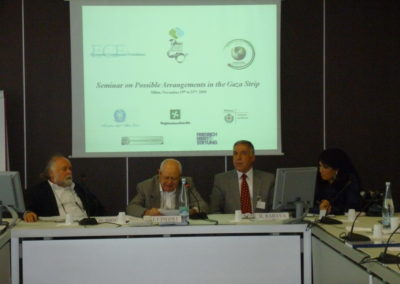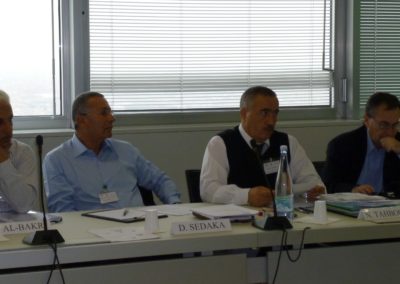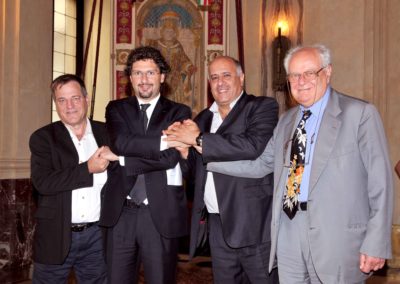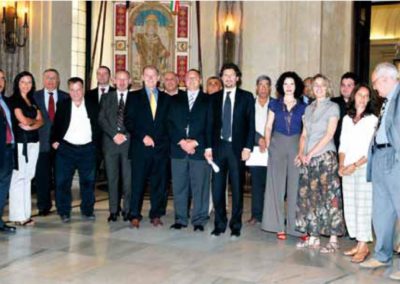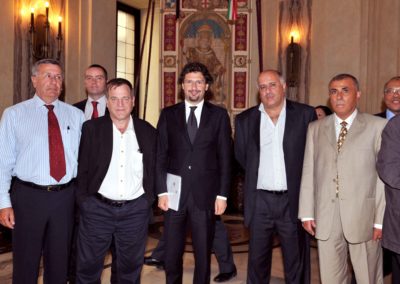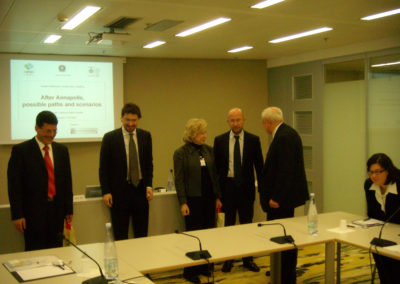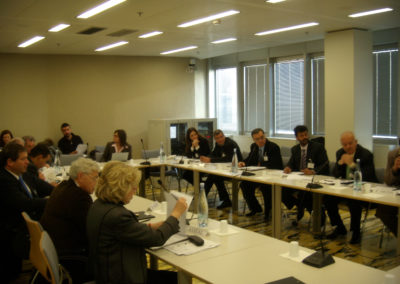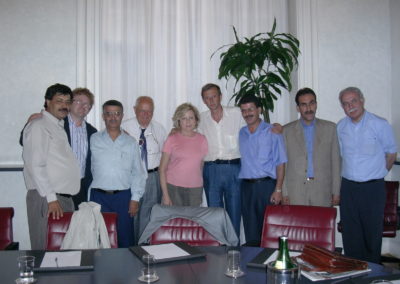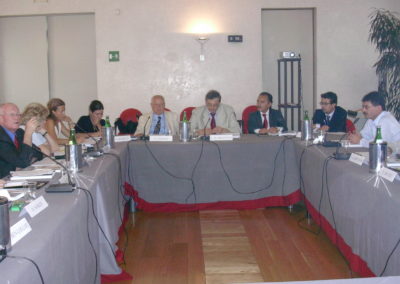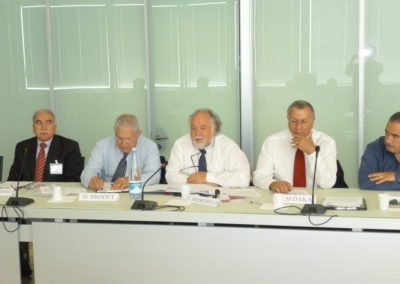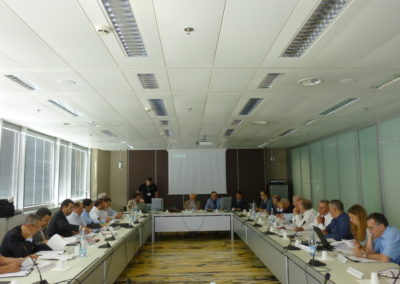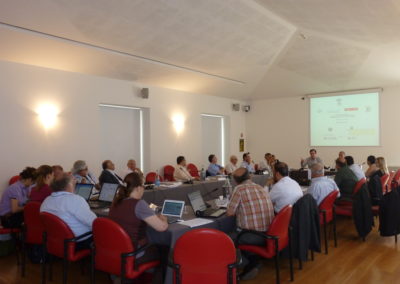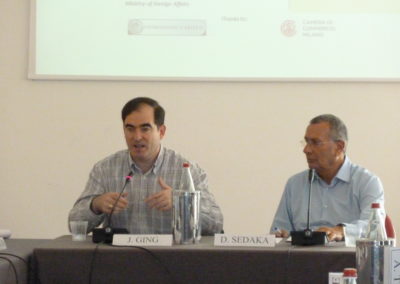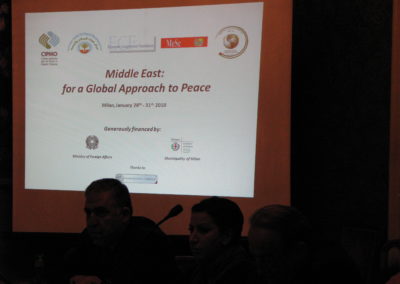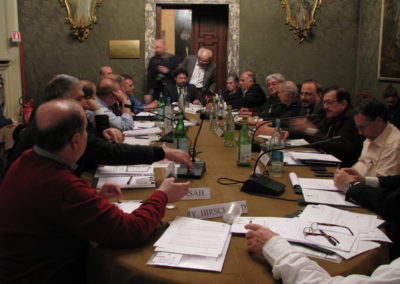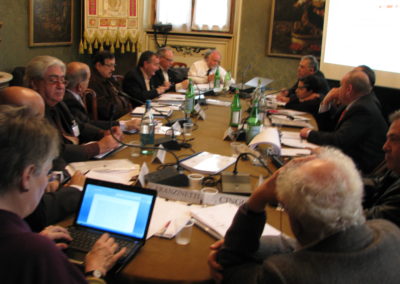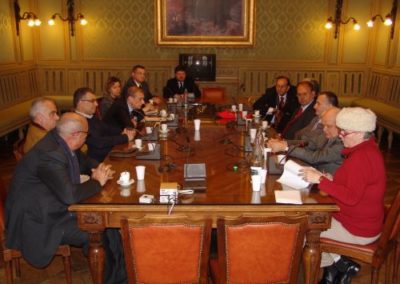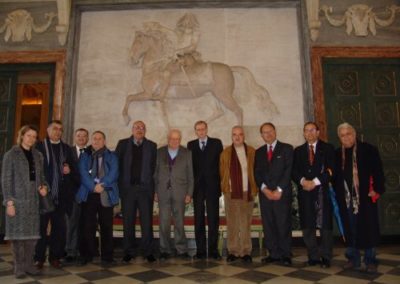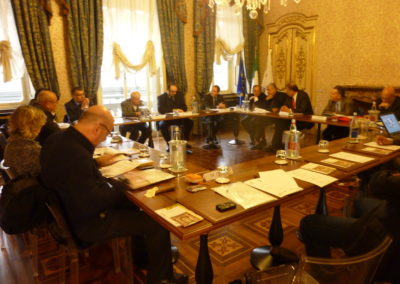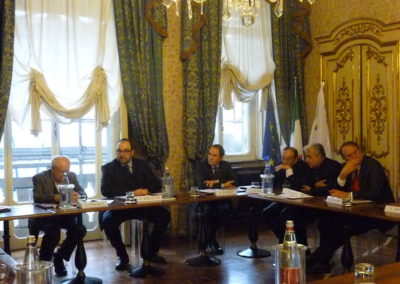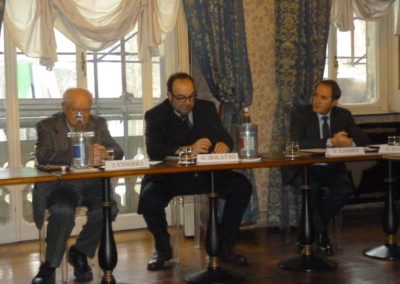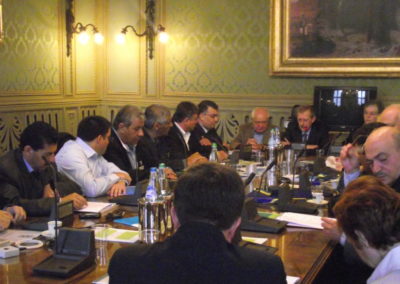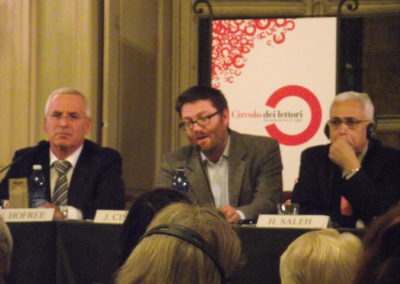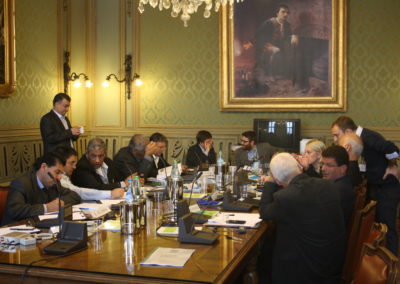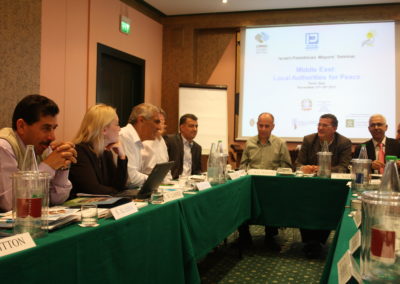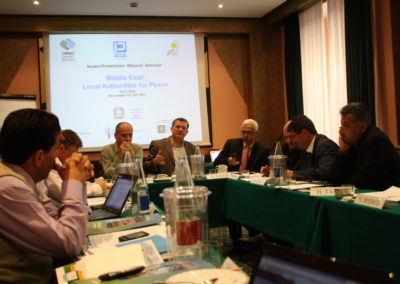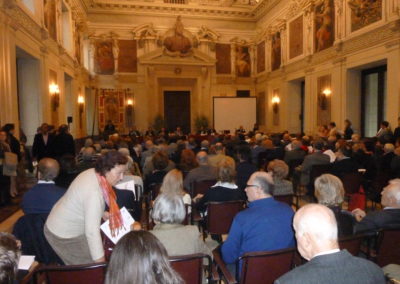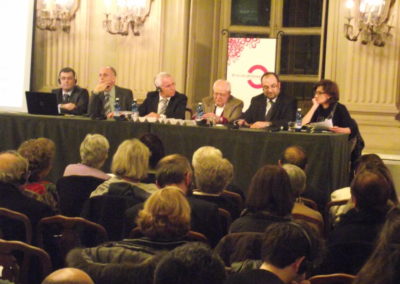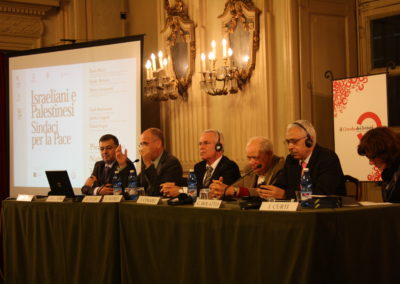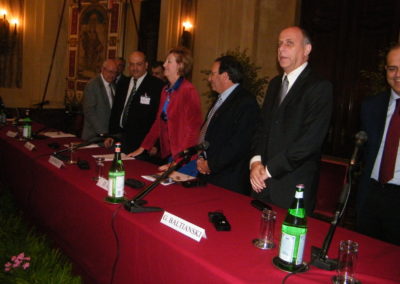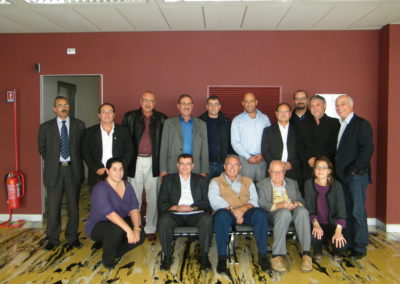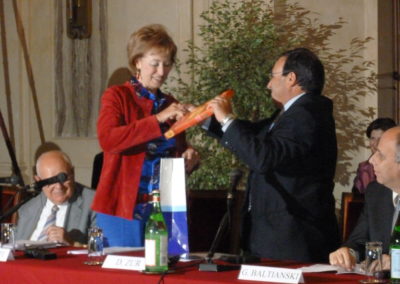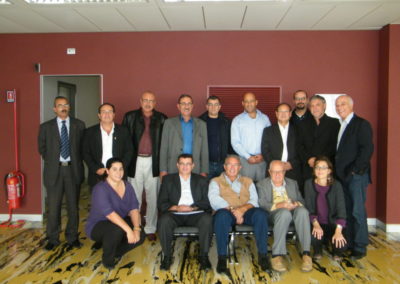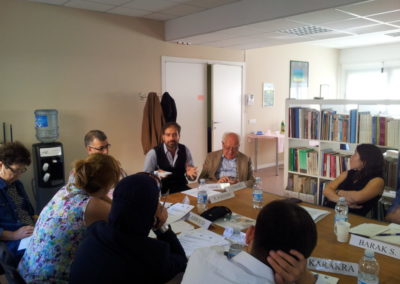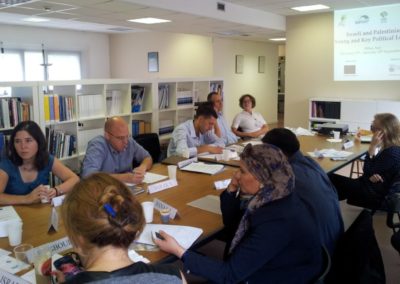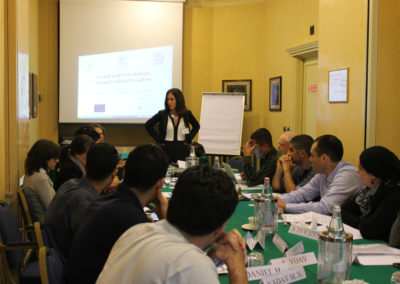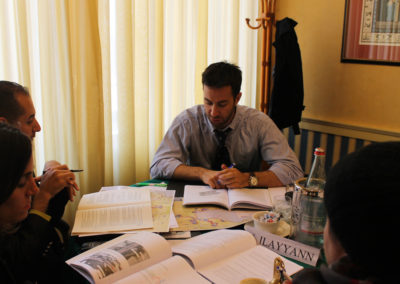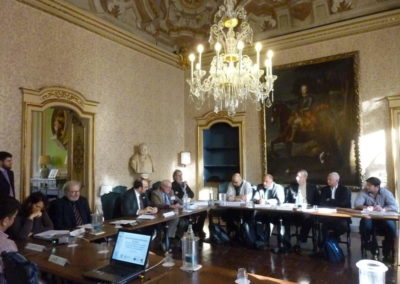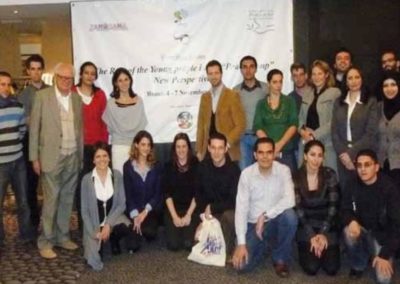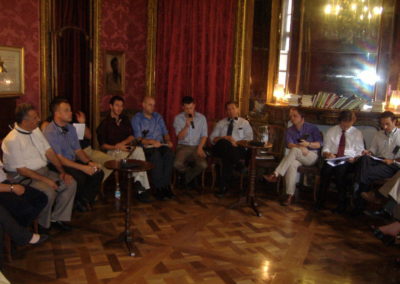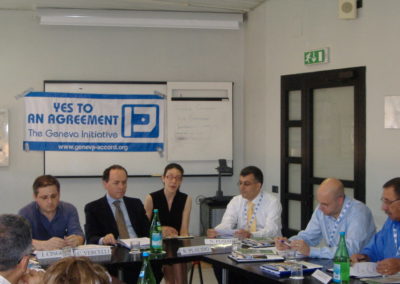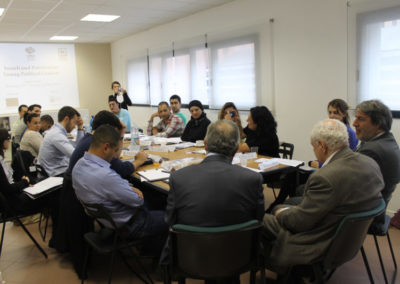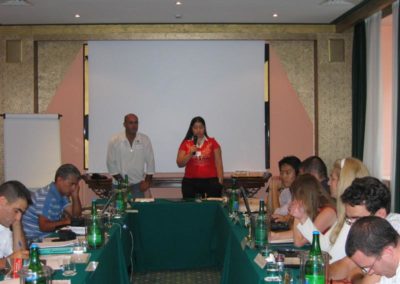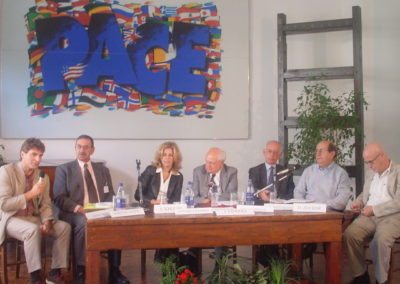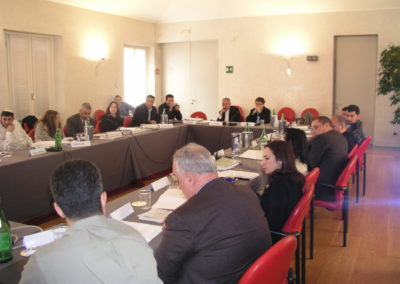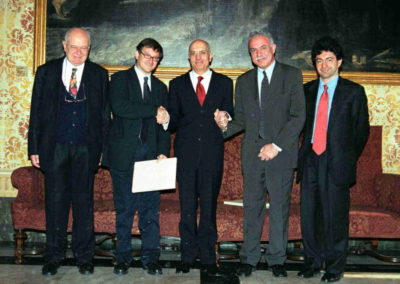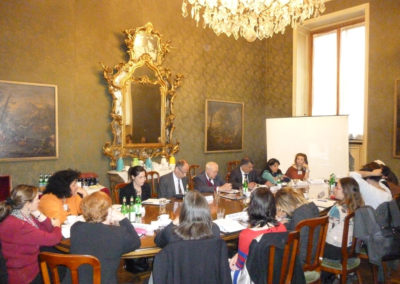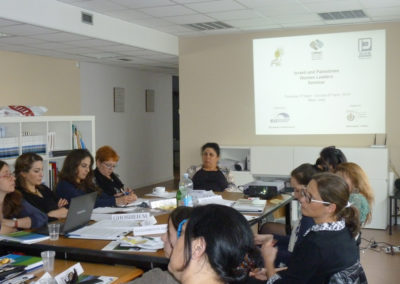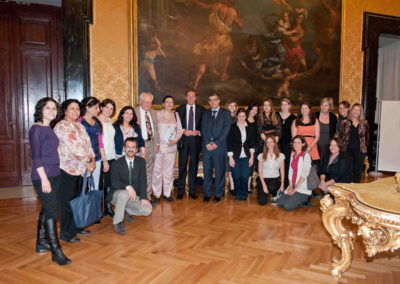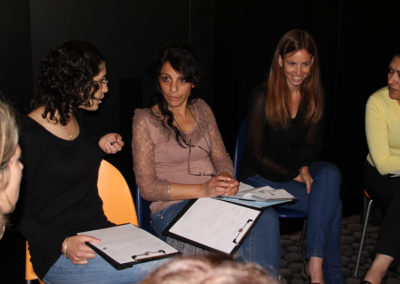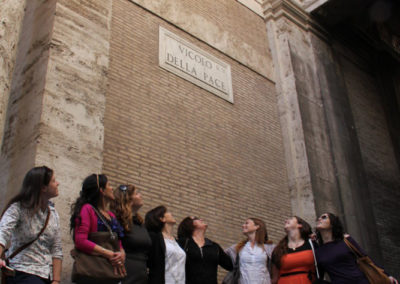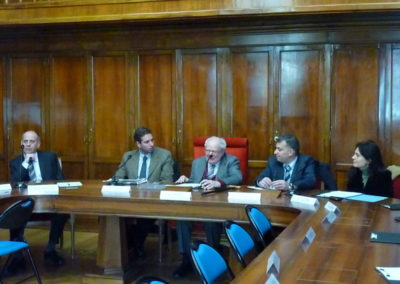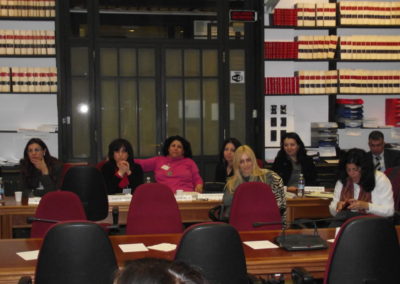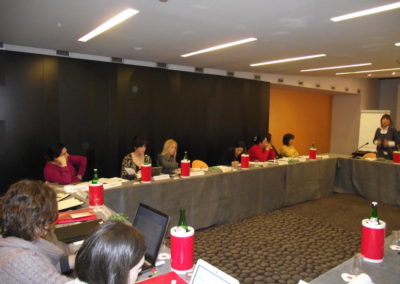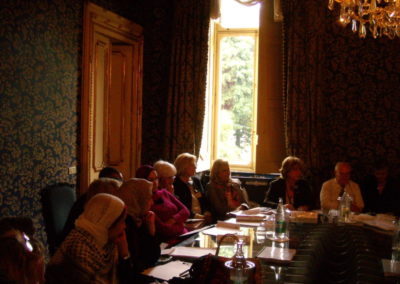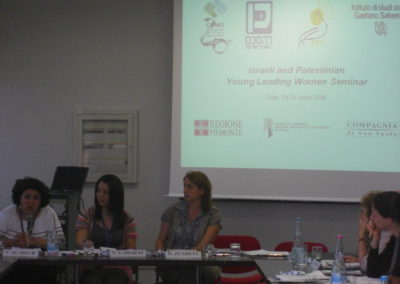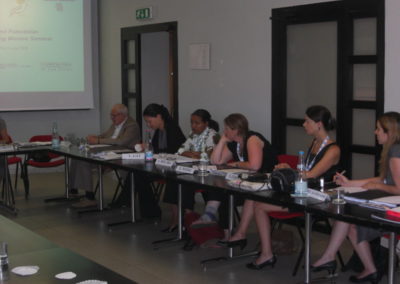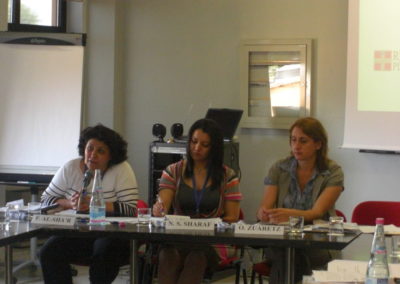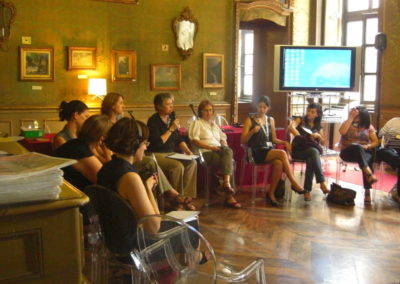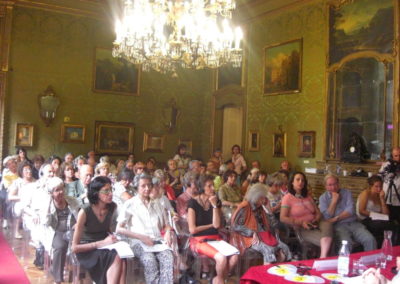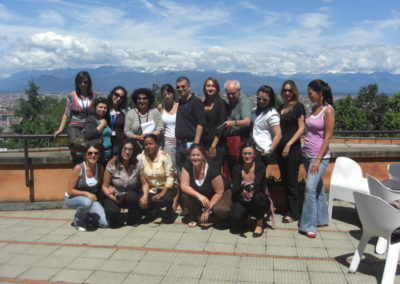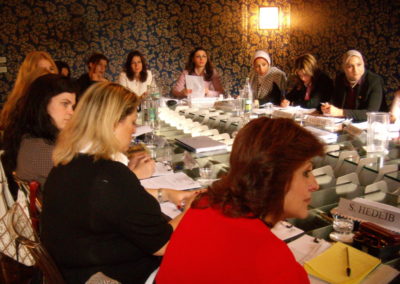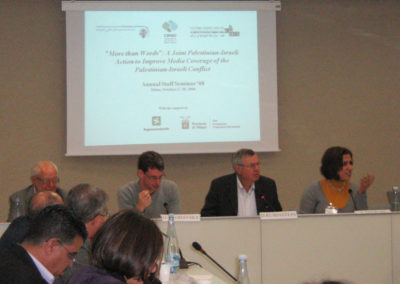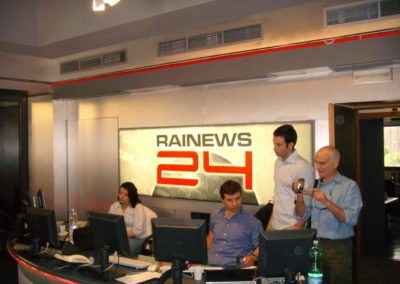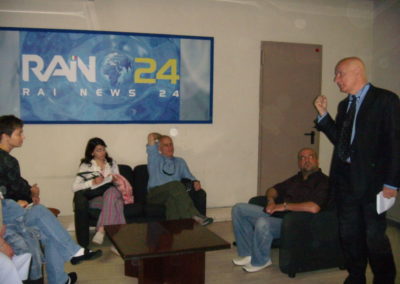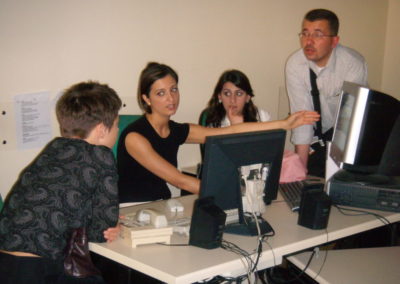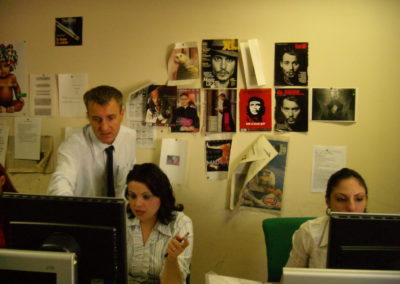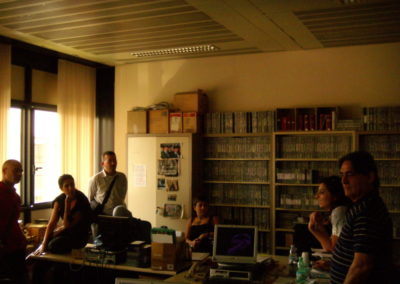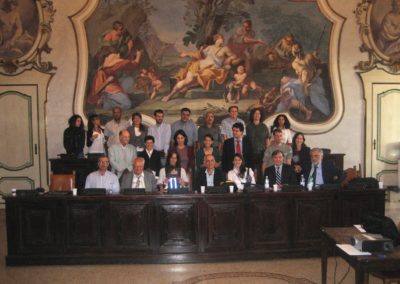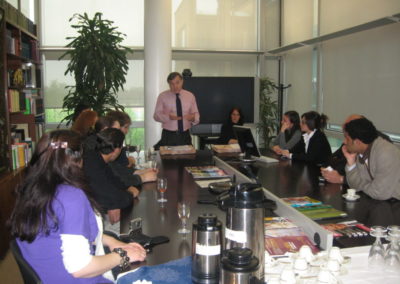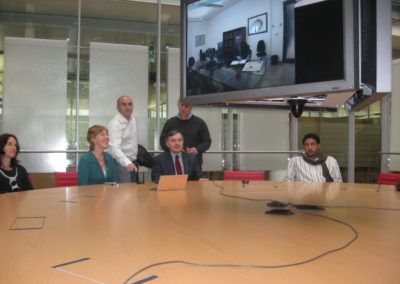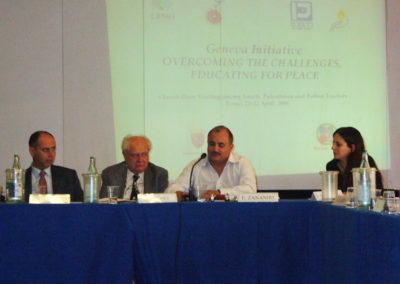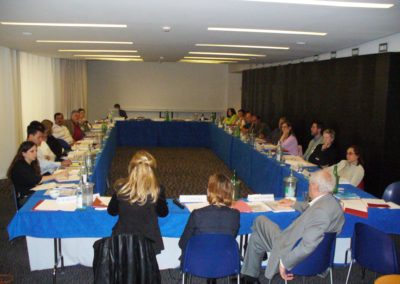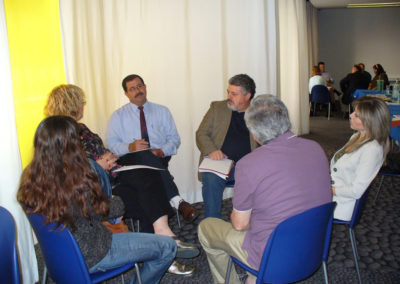Home ≫ TOPICS ≫ GEOPOLITICS

CLOSED-DOOR MEETINGS
The first three international conferences on peace in the Middle East (1989 – 1993)
Soon after its establishment, CIPMO launched a series of para-diplomatic activities (track II), the first of which was the organisation in 1989 of the international conference “Perspectives for Peace in the Middle East”, held on 16-18 November 1989 in Milan, with the support of the Italian Ministry of Foreign Affairs and the then European Economic Community (EEC). Two other conferences soon followed, namely “Israelis and Palestinians: When Women Talk about Peace” (Milan, 16-18 May 1991) and “Israelis and Palestinians: Walking toward Peace” (Milan, 34-26 June 1993). In those times, under the law of Israel it was illegal for Israeli citizens to meet exponents of the Palestine Liberation Organisation (PLO): these conferences helped overcome this taboo and promoted channels of direct dialogue that contributed to the start of official negotiations.
After the three afore-mentioned major events, which witnessed the participation of many Israeli, Palestinian and Arab exponents as well as distinguished members of the international community, and after that the Washington Agreements had been signed in 1995, CIPMO decided to focus on more specific activities linked to the analysis and support of the final negotiations between Israelis, Palestinians, and Arabs. Therefore, the Center organised closed-door meetings for important personalities coming from these countries and for civil society exponents.
All meetings were held in Italy in close collaboration with the Italian Ministry of Foreign Affairs, several Italian regions and local authorities, and (for some projects) the European Union. These meetings allowed politicians, religious exponents and civil society members to meet on a neutral ground, so as that they could have a closer exchange of opinions and ideas and elaborate new useful information concerning the negotiations themselves.
INFORMAL DIPLOMACY – TRACK II
Para-diplomatic closed-door meetings with key personalities.
JERUSALEM
The role of Jerusalem has always been at the core of CIPMO’s activities and reflections.
City of Jewish tradition and of biblical promise, linked to Christianism and to Islamic mysticism, Jerusalem is not just a place of fundamental symbolic meaning for the three monotheistic faiths mentioned above, but it is also a living, real city that has been bone of contention for millennia and that lies at the heart of dramatic conflicts that scars the Middle East still today. Territorial sovereignty over East Jerusalem is matter of international controversy, and the determination of its final status is one of the hurdles of the peace process. In the framework of the EU Programme “Partnership for Peace” and with the support of the Italian Ministry of Foreign Affairs, the Center has carried out a three-year project about Jerusalem, aimed at analysing the different national, religious and municipal issues pertaining to the city.
“Religious Aspects of the Jerusalem Issue” May 1995, Florence
The seminar “Religious Aspects of the Jerusalem Issue”, held in 1995 in Florence, was organized by CIPMO together with the Palestinian Academic Society for the Study of International Affairs (PASSIA) and the Economic Cooperation Foundation (ECF) of Tel Aviv, in collaboration with the Region of Tuscany and the Province of Florence, with the approval of the Italian Ministry of Foreign Affairs and International Cooperation (which sent a representative to the initiative) and with the decisive contribution of the European Commission.
In February 1996, on the occasion of the public presentation of the results of the 1995 seminar, two seminars were organized (one in Milan and the other in Rome) that witnessed the participation of the representatives of the above-mentioned Israeli and Palestinian centers, namely Ron Pundak and Mahdi Abdul Adi. The outcomes of the seminars were collected and published in a special issue of the magazine Testimonianze in December 1996.
The seminar in Rome was attended by a representative of the Italian Ministry of Foreign Affairs and international Cooperation and of a representative of the Holy See, Monsignor Luigi Gatti. The Initiative was organized in collaboration with of CeSPI (Study Centre for International Politics) and of SIOI (the Italian Society for International Organization), and it took place in the SIOI premises.
The seminar in Milan was organized in collaboration with the Faculty of Political Sciences of the University of Milan, and with the patronage of the Region of Lombardy, the Municipality of Milan, the Province of Milan, the European Commission Representation in Milan and of IRSSAE Lombardia (Regional Institute for Research on Education – Lombardy).
EU Project “People to People” 2001-1999
“Israelis, Palestinians, Jerusalem”, 1999-2001
In the framework of the EU Programme “People to People” , and with the support of the Italian Ministry of Foreign Affairs, the Center has carried out a three-year project about Jerusalem, aimed at analysing the different national, religious and municipal issues pertaining to the city. The initiative was promoted in collaboration with the Palestinian organisation Orient House and the Israeli Economic Cooperation Center (ECF), and it benefitted from the support of the two Ministers with responsibility for Jerusalem, i.e. the Israeli Haim Ramon and the Palestinian Faisal El-Husseini (who delegated the Panorama Center of Ramallah). The initiative aimed at contributing to the development of the peace process and at bringing the final status of the city of Jerusalem in to focus. The project comprised three closed-door meetings, which were attended by delegations made up of important Israeli and Palestinian exponents: “Jerusalem: Models for Future Coexistence”, Montecatini, December 1999; “A special religious regime for Jerusalem in peace”, Milan, 22-25 June 2000;“The future of Jerusalem”, Pisa, 27-29 July 2001.
A significant moment of the project took place on the occasion of the Seminar on the Religious Regime in Jerusalem, when a letter sent to the attendants by Eliyahu Bakshi-Doron, Sephardic Chief Rabbi of Israel was read. In the letter, to which the international press gave great prominence, the Rabbi sustained the possibility to relay the sovereignty on the Esplanade of the Mosque. During the meetings there were touching moments, such as on Friday evenings – which is holiday for both religions – when the rabbis and the imams attending the meeting in 2000 shared their respective celebrations.
The attendants agreed on guaranteeing the freedom of religion, of worship, and of free access to the Holy Places to all mankind. The ideas developed regarding the promotion of different kinds of sovereignty in Jerusalem and of the possibility of dividing and sharing this sovereignty (especially in the Old City) were presented and used during the negotiations at Camp David and Taba. They were later included into the Geneva Accord.
The final meeting, held in Tirrenia (Pisa) on 27-29 July 2001, was organised in collaboration with the Arab Study Society (Orient House) of Jerusalem and the Economic Cooperation Foundation (ECF) of Tel Aviv. The event was made possible also thanks to the contribution of the Region of Tuscany and of the Province of Pisa. The initiative was attended by an Israeli delegation headed by Yair Hirschfeld, Director of ECF, and a Palestinian delegation, led by Manuel Hassasian, President of the University of Bethlehem.
Both delegations presented research studies about the political, religious, municipal and demographic aspects of Jerusalem. However, the meeting has a much wide impact, since in a very friendly atmosphere the delegations underlined the need for re-building an Israeli-Palestinian partnership for peace. The seminar had wide resonance on the Italian media, and the talks were permeated by what the participants themselves hade termed “the Spirit of Pisa”.
A special religious regime for Jerusalem in peace, 22-25 June 2000, Milan
CIPMO organised the closed-door meeting “A Special Religious Regime for Jerusalem in Peace”, held in Milan in June 2000. The meeting was a follow-up of the EU People-to-People project “Israelis, Palestinians, Jerusalem”, and it was made possible thanks to the contribution of the European Union, the Italian Ministry of Foreign Affairs, and the Municipality of Milan.
The event was organised in collaboration with the Economic Cooperation Foundation (ECF) of Tel Aviv and the Arab Studies Society (Orient House) of Jerusalem. Both the Israeli and the Palestinian delegation comprised politicians and religious exponents.
At the seminar also took part Daniele Verga, Director of the Middle East Department at the Italian Ministry of Foreign Affairs, and – as an observer for the Holy See – Monsignor Giovanni D’Aniello, from the Secretariat of State of the Vatican.
Israeli and Palestinian representatives, experts, and religious exponents of the three faiths represented there gave their contribution. Although opinions and approaches differed, all parties assured their commitment to ensuring a peaceful coexistence in Jerusalem. The attendants also stressed the necessity of a long-term solution regarding the political issues between Israelis and Palestinians, as well as regarding freedom of religion, of worship, and of free access to the Holy Places – always bearing in mind the international scope of the problem and the protection of existing international interests.
Jerusalem: Models for Future Coexistence, December 1999, Pisa
CIPMO held a closed-door seminar “Models for Future Coexistence” in Montecatini in 1999. The meeting – part of the EU People-to-People project “Israelis, Palestinians, Jerusalem” – focused on the religious aspects of the sovereignty on Jerusalem and was attended by Israeli and Palestinian delegations (both comprising Members of the Parliament and academics) as well as by Daniele Verga, Director of the Middle East Department at the Italian Ministry of Foreign Affairs, and Simone Siliani, Councillor for Cooperation at the Region of Tuscany. The main issue discussed in this seminar was the thorny issue of Jerusalem and the various possible types of sovereignty on the old city – amongst the most complex hurdles in the final negotiation.
FINAL STATUS
Since 1987 CIPMO has promoted several closed-door meetings regarding the prospects of the Peace Process, involving Israeli and Palestinian delegations made up of scholars, intellectuals, members of Parliament, and collaborating with the Italian institutions. Some of these seminars allowed the first direct discussion between same-level exponents of different factions to take place.
Final Status, 2015-1997
Breaking the Israeli-Palestinian impasse. The role of Europe. 28th-31st January 2015, Rome
A delegation of Israeli and Palestinian exponents of the Geneva Initiative met for two days in Rome at the Italian Ministry of Foreign Affairs. High-ranking officials from the Ministry and also from the European Commission took part in the work. The works were concluded by the Under-Secretary for Foreign Affairs Benedetto Della Vedova, who deeply appreciated the initiative and its outcomes.
The delegations jointly presented specific ideas on how to “break the impasse” between Israelis and Palestinians and on the role that Europe can play, also in relation to possible future initiatives at the level of the UN Security Council. The seminar meeting was organized by CIPMO-Italian Center for Peace in the Middle East, in collaboration with the Israeli and Palestinian Offices of the Geneva Initiative, and was realized thanks to the support of the Italian Ministry of Foreign Affairs – General Division for Business Politicians and Security.
The Heads of Delegation: Mr. Qaddura Faris, Former Minister of Prisoner Affairs in the Palestinian Authority; Brig. Gen. (ret.) Shlomo Brom, Senior Research Associate at the Institute for National Security Studies and Former Chief of the Strategic Planning Division in the Israeli Army.
Track II seminar on security issues related to the Final Status, 13-17 November 2013, Rome
From 13 to 17 November 2013, CIPMO organised a track II seminar – financed by the Head Office for Political Affairs of the Italian Foreign ministry of Foreign Affairs – on the security issues linked to the Final Status. The initiative was organized in collaboration with the Israeli and Palestinian Committees of the Geneva Initiative.
The four-day seminar coordinated by CIPMO offered to the Israeli and Palestinian delegations the opportunity to share ideas on the issues of security and reconciliation. The main object of the initiative was developing new proposals and insights providing new understanding of critical aspects, factors and elements that are part of the on-going negotiation process between Israel and the PNA. The hearing session of November 15 allowed the two delegations to meet with members of the Italian Foreign Ministry. During the following days, both delegations, with appropriate changes in their composition, were able to brainstorm on the challenging issue of reconciliation, proceeding in the elaboration of possible itineraries and initiatives that will foster reconciliation between Israelis and Palestinians once the Final Status agreement is signed.
The head of the Israeli delegation: Brig. Gen. (ret.) Shlomo Brom, Senior Research Associate at the Institute for National Security Studies and Former Chief of the Strategic Planning Division in the Israeli Army.
The head of the Palestinian delegation: Dr. Samih Al-Abed, Member of the Palestinian Negotiation Team, head of the Committee for Borders and Territory and former Minister of Public Works & Housing.
It has been a complex initiative that started with the publication of the paper “Regional Security in the Context of a Palestinian-Israeli Peace Process”.
The Geneva Accord. In search of the missing Annex, 4-7 December 2008, Turin
From 4 to 7 December 2008, CIPMO organized the closed-door meeting “The Geneva Accord. In search of the missing Annex” in collaboration with the coordinating organizations of the Geneva Initiative, that is the Palestinian “Palestinian Peace Coalition” and the Israeli “H.L. Education for Peace”.
This closed-door meeting was organized on the assumption that the Geneva Peace Accord Model lacked the so-called Annexes, i.e. the sections regarding the details of the Israeli-Palestinian final status. The seminar was attended by high-level personalities: the head of the Palestinian delegation was Samih Abed, member of the Palestinian Negotiation Team and deputy minister of the Palestinian National Authority; the head of the Israeli delegation was Boaz Karni, president of the Israeli Board for the Geneva Initiative. The mediator was Ambassador Jean-Daniel Ruch, the Special Representative for the Middle East of the Swiss Ministry of Foreign Affairs.
The objective of the seminar was to complete the drafting of the Geneva Peace Accord Model Annexes and to draw up a final proposal of agreement to be presented to the newly-elected Obama. The initiative was carried out with the support of the Region of Piedmont and of the Compagnia di San Paolo.
Trilateral Arrangements for the Gaza Strip. 7-10 July 2008, Milan
CIPMO organized a closed-door meeting among some of the most important Israeli, Palestinian, Egyptian and European figures and security experts. It was amongst the most important seminars of the last few years, since it was held in a radically different context from the one envisaged by the Bush administration – and the participants themselves were the players that the US President had somehow neglected. Themeeting took place a few weeks after the “truce” between Israel and Hamas in Gaza had set in, thanks to the Egyptian mediation.
The meeting was organised in collaboration with the Economic Cooperation Foudation (ECF) of Tel Aviv and the Palestinian Center for Strategic Studies (PCSS); the initiative witnessed the participation of thirteen high-level exponents from Israel and Palestine, Egypt and Europe. The Israeli delegation was led by Yair Hirschfeld, general director of Economic Cooperation Foudation (ECF), and one of the creators of the Oslo Accord, whereas the Palestinians were led by Jibril al-Rajoub, former head of the Palestinian Security Services. Also present was a representative of EUBAM, a European force already present in Rafah, which borders Egypt.
The objective of the meeting was to discuss in depth the methods for re-opening the Gaza Strip, and the possible role of the international community in carry this out. As it is well known, the recent ceasefire stipulated by the Israelis and the Palestinians of Gaza, with Egyptian mediation, provided for a gradual re-opening of the Gaza Strip, in the context of negotiating for the exchange of prisoners. This made the initiative of the seminar even more relevant, also considering the presence of the Egyptian delegation.
After 3 days of seminars, the final conclusions were that international involvement can be of great importance in the case of the Gaza Strip. It can have a wide range of forms, deal with a wide range of issues, and can involve a wide range of players. It can foster internal Palestinian dialogue, help to re-open the Rafah Crossing and other border crossings around Gaza, and may also be conducive (at a later stage) to the re-opening of the Gaza Strip’s air and seaports, as well as to maintaining the current ceasefire agreement. However, for any form of international intervention to succeed, it must have the agreement, or at least collaboration, of all sides (as the good example of the MFO shows). One of the major achievements of the seminar was the involvement of senior Egyptian security personnel and of representatives from the Dutch and EUBAM missions; this highlighted the great importance of the involvement of Arab countries (particularly Egypt, but Jordan and Saudi Arabia as well), which could and should have a central role in any future discussion on international involvement regarding the Gaza Strip border crossings and on other issues as well.
The meeting was made possible thanks to the support of the Italian Ministry of Foreign Affairs, of the Presidency of the Milan City Council, and of the Region of Lombardy.
After Annapolis: Possible paths and scenarios, 17-20 January 2008, Milan
A closed-door meeting in Milan with important Israeli and Palestinian political players. The objective of the meeting was to bring together high-level political representatives to conduct a joint assessment of the current situation in their countries following the Annapolis Conference.
Colette Avital, the Knesset Vice President and Head International Affairs within the Labor Party, headed the Israeli delegation, which was made up of representatives of Labor, Kadima, Merez and the Pensioners’ Party, also including Mark Heller, Director of Research at the National Security Studies Institute in Tel Aviv. The Palestinian delegation was led by Fares Kaddoura, a former minister in the PA and a close ally of Marwan Barghouthi, the leader of the Second Intifada and currently imprisoned in Israel. He was accompanied by Ziad Abu Zayyad, who has also been a minister, along with various other members of the so-called Fatah “young generation”, among whom there were a few members of the Palestinian Legislative Council. Form many participants, it was the first time that they were able to meet exponents from the other side of that calibre.
It has been pointed out that it is necessary for the Israelis to remove the so-called “illegal outposts” that would stop any settlement expansion, as well as to remove roadblocks, in accordance with what is included in the Road Map’s First Phase. However, it has also been agreed that the removal of roadblocks should take place in conjunction with Palestine’s taking of more responsibility for security problems – both in terms of ensuring law and order in their cities and in terms of working towards the disarmament of armed militias.
The Palestinians condemned the launch of Kassam rockets, but they also underlined that Abu Mazen – in spite of his statements of principles – is not capable of stopping the launches alone, but he would need a new agreement with Hamas. The latter should be brought back to the negotiation framework, although it should be kept out of direct peace talks. This implies that Israel does not reject such a possible development and does not block ongoing negotiations, understanding that only such an agreement could guarantee its very security. On the whole, the Israelis taking part in the initiative agreed on that position, regardless of the concrete implementation forms that such an agreement will have.
The final discussion focused on the need to create an international intervention force, first in the Gaza Strip and possibly, also in the West Bank at a future time (similar to the force currently active in Lebanon). All participants agreed that such a force could not be established as a result of international imposition, but rather as the outcome of an agreement between all parties involved –the Palestinian side (Fatah and Hamas), as well as the Israeli side. It was also agreed that there is no need to wait for a final peace agreement and that – provided that all parties agree – such an international force of intervention could be structured and actually deployed as an interim measure and as a warranty aimed at building confidence.
The event benefitted from the valuable contribution of Sergio Scarantino, Minister Plenipotentiary from the Ministry of Foreign Affairs, Roberto Ronza, Undersecretary for international Relations at the Region of Lombardy, and Manfredi Palmeri, president of the Milan City Council. The meeting was made possible thanks to the support of the Ministry of Foreign Affairs and the Milan City Council, in collaboration with the Region of Lombardy.
Israelis-Palestinians. Beyond the Road Map, 22-24 March 2007, Milan
The Italian Center for Peace in the Middle East (CIPMO) promoted and organised an important closed-door seminar between Israeli and Palestinian officials, political exponents and intellectuals.
The Israeli group was headed by Colette Avital, Member of the Knesset and responsible for the International Relations within the Labor Party, and included also political representatives from Labor and from Kadima in addition to leading journalists and intellectuals.
The Palestinian delegation was headed by Riad El Malki, Director of Panorama – the Center for the Dissemination of Democracy and Community Development in Ramallah, which is among the most important Palestinian NGOs working for the promotion of dialogue among the two conflicting parties and included also components from Fatah and from other secular parties.
A central point in the discussion was precisely the analysis of the actual contents of the inter-Palestinian Mecca Agreement. There was across-the-board agreement on the fact that this development was very important; that it could consolidate and prolong the present ceasefire and ensure the respect of the previous treaties; and that it can also be considered as a significant step towards fulfilling the conditions set by the International Community.
The discussion then focussed on the Arab Plan approved in 2002, and all participants agreed on the historic importance of involving the Arab League, particularly of Saudi Arabia, in the promotion of the peace process, even while it was pointed out that leaving Syria out of the possible resumption of the peace process would be a mistake. One of the concerns that were expressed in the meeting was that if the Arab proposal failed, the moderate components within the Arab world would be dealt a serious blow, and the extremist forces would be further strengthened.
The Ministry of Foreign Affairs and international Cooperation, of the Region of Lombardy and of the Municipality of Milan contributed to the realisation of this seminar. The sessions were attended by Daniele Bosio, advisor of the Ministry of Foreign Affairs; Roberto Ronza, Undersecretary for International Relations and Advisor to the President of the Region of Lombardy; Giuseppe Costa, head of International Relations and International Cooperation Unit at the Region of Lombardy; Manfredi Palmeri, President of the City Council of the Municipality of Milan.
Likud-Labour-Shinui-Al Fatah, 1-4 September 2005, Milan
This seminar was organised in a moment where the Middle East seemed on the verge of a major turning point, which could have brought about the resumption of the peace process.
In September 2005, CIPMO organized a closed-door meeting among Israeli and Palestinian high political representatives in Milan.
The delegations were composed of high-level politicians: the Israeli delegation, led by Colette Avital, Vice President at the Knesset, comprised Members of the Knesset belonging to the Labour Party, to Likud and to Shinui. The Palestinian delegation was led by Fares Kaddura, member of the Palestinian Legislative Council (PLC) member, and was composed of other PLC members as well as of high-level personalities belonging to Fatah and others secular parties. The meeting was also attended by Minister Plenipotentiary Sergio Scarantino from the Ministry of Foreign Affairs.
The objective of the meeting was to gather together high-level political representatives to discuss the current situation in their countries and explore short and middle term strategies aiming at reaching a full and comprehensive peace in the Region.
The parties discussed in an open and positive way on short and middle term possible scenarios and strategies to coordinate unilateral steps following the withdrawal from Gaza. Moreover, the two delegations had the chance to directly address their own requests to the other side.
The Israeli-Palestinian Conflict towards the Final Status, 4-5 October 2002, Pisa
This closed-door meeting between Israelis and Palestinians was organized by CIPMO in cooperation with the Panorama Center of Ramallah and the Israeli Economic Cooperation Foundation (ECF) of Tel Aviv. The meeting was attended by six representatives from each delegation, including academics and high-level experts, important official Palestinian representatives, the actors involved in the past peace negotiations, the directors of the two above-mentioned centers, i.e. the Palestinian Riad El-Malki and the Israeli Ron Pundak (one of the Oslo negotiators).
The participants discussed the fundamental issues related to the political trends and internal mood of both societies, their impact on the conflict and the possibility to return to significant peace negotiations. The meeting witnessed an abundance of proposals, such as Malki’s, who suggested to draft a Final Status Action Plan to be presented to the Eu and the USA, or Menachem Klein’s, who suggested to organise a conference in Europe to be attended by different Israeli and Palestinian movements for peace, in an attempt to raise public awareness on the conflict and to pressurize governments more effectively.
The seminar was supported by the Italian Ministry of Foreign Affairs, the Region of Tuscany and the Province of Pisa.
Egypt and Israel. Perspectives on the Peace Process, 18-21 February 1999, Milan
In February 1999, the Center organized a private seminar entitled “Egypt and Israel. Perspectives on the Peace Process”.
It was attended by a delegation of the Egyptian Peace Movement and by a Likud delegation composed of members of the Knesset. This was the first meeting ever to be organized between representatives of these two sides.
The Egyptian delegation was led by the Egyptian Ambassador to Israel, Salah Bassiouny, while the Israeli delegation was led by the head of the majority coalition in the Knesset, Meir Sheetrit.
During the meeting, the two sides discussed the fundamental issues concerning the Peace Process perspectives and the development of bilateral relations between their two countries under various intertwined aspects.
The initiative was supported by the Italian Ministry of Foreign Affairs and the Presidency of the Municipality of Milan.
Likud and Al-Fatah, 21-24 May 1997, Montecatini
The preparatory activities for this closed-door meeting lasted more than a year, but they bore fruit: the meeting was the first meeting ever held between MPs from Likud, the largest right-wing party in Israel, and Al-Fatah, the party led by Yasser Arafat.
The Israeli delegation was led by Meir Sheetrit, Head of the Majority Coalition of the Knesset, while the Palestinian delegation was headed by Marwan Barghouti, General Secretary of al-Fatah for the West Bank. The contacts established between the two heads of delegation opened a channel of communication between Netanyahu and Arafat, thereby facilitating the agreements of Wye Plantation and the Israeli partial withdrawal from Hebron.
The participants discussed in an open, frank and informal way fundamental issues concerning the Middle East peace process and the implementation of an interim phase of the previously signed agreements, as well as the possibility of a quick resumption of the negotiations on the final status.
The meeting was made possible thanks to the support of the Region of Tuscany, in collaboration with the Ministry of Foreign Affairs and with the European Union.
The Arab Peace Initiative
Since 2008, CIPMO has held several seminars that have as a reference the Arab Peace Iniziative of 2002, essential for the resolution of the conflict.
Arab Peace Initiative
Starting afresh from the Arab Peace Initiative, 3-5 July 2010, Milan
The closed-door meeting “Starting afresh from the Arab Peace Initiative” witnessed the participation of important personalities and security experts from Israel, Egypt, Jordan, Palestine and Saudi Arabia. They thoroughly discussed the situation and the necessity of a new approach that could lead to the resumption of the peace process, building on the Arab Peace Plan and coordinating the support to the establishment of a Palestinian State with a comprehensive, top-down and bottom-up approach.
The Egyptian delegation was led by Ezzedine Choukri Fishere, professor at the American University in Cairo and former advisor to the Egyptian Foreign Minister; the Jordan delegation was headed by Gen. Mansour Abu Rashid, director of the Amman Center for Peace and Development and former coordinator of the peace treaty negotiations with Israel; the Israeli delegation was led by Yair Hirschfeld, director of the Economic Cooperation Foundation (ECF) and negotiator of the Oslo Accords; the Palestinian delegation was headed by Gen. Jibril Al-Rajoub, director of the Palestinian Center for Strategic Studies, advisor to President Mahmoud Abbas on security issues and former head of the Palestinian security services in the West Bank. Moreover, important Saudi and Jordanian personalities attended the meeting, as well as a representative from the Arab League. Finally, the Director of the UNRWA in Gaza, John Ging, gave his decisive contribution to the discussion regarding the current situation in the Gaza Strip.
Paolo Alli, Undersecretary for EXPO 2015 at the Region of Lombardy, gave an opening speech in which he underlined the importance that the Region of Lombardy gives to peace in that strategically vital area. Luigi Efisio Marras, Acting Director General for the Middle East and the Mediterranean at the Italian Ministry of Foreign Affairs, sent a message to the participants, confirming the commitment of the Ministry of Foreign Affairs to promoting peace in the region, and praising CIPMO for the role it had been playing.
Particular attention was devoted to the 2002 Arab Peace Plan and to the Fayyad Plan. In this respect, it was underlined that the Israeli moratorium on building in the West Bank will expire in September, as will the indirect talks between Israelis and Palestinians, which had been taking place with US mediation. The risks stemming from an increased probability of further crises are high, which calls for an action that could push for direct negotiations to take place as soon as possible, even by means of informal channels.
Furthermore, all delegates take stock of how diverging the position of the parties were, owing to the conditions of insecurity and frustration in which both the Israelis and the Palestinians had been living, and confirmed that that situation needed to be overcome by means of appropriate tools for providing security to both parties. Security represents a pillar for any possible final negotiation aiming at solving the Israeli-Palestinian-Arab conflict while ensuring the participation of international actors, including the Arab ones. However, the quest for security cannot replace or hinder the strive for a more comprehensive approach to peace, considered in all its political, economic, and territorial aspects.
Finally, discussions focused on the current situation in Gaza and on the need to go beyond the economic blockade in place. John Ging, Director of UNRWA in the Gaza Strip, highlighted how the existing blockade harms basically the population and the entrepreneurs, who are in favour of a peaceful solution, whereas it strengthens the criminal informal economy, based on trafficking through tunnels and linked to Hamas governing apparatuses. Those are hostile to any normalization of the situation and to the overcoming of the inter-Palestinian fracture, since they draw power and wealth from the perpetuation of such a situation, whilst 80% of the population becomes increasingly poorer.
It is therefore necessary to restore the operativity of the border crossing, which are the most effective instruments for combating arm smuggling and the trafficking of other goods that threaten security.
The meeting was promoted by CIPMO in cooperation with the Amman Center for Peace and Development (ACPD), with the Tel Aviv Economic Cooperation Forum (ECF), with the Palestinian Center for Strategic Studies (PCSS) of Ramallah and other important research centres of the region. The seminar was made possible thanks to the contribution of the ministry of Foreign Affairs and international Cooperation – Directorate General for the Mediterranean and the Middle East, of the Presidency of the Region of Lombardy, and of Fondazione Cariplo.
The Middle East. For a Global Approach to Peace, 28-31 January 2010, Milan
The closed-door meeting “The Middle East. For a Global Approach to Peace” was organized by CIPMO and reserved for top-level personalities from Saudi Arabia, Jordan, Israel, Lebanon and the Palestinian Territories. The initiative coincided with the visit of the then Italian President of the Council of Ministers, Silvio Berlusconi, to Israel, and it dealt with the current situation in the region as well as with the need for a new approach that could lead to a resumption of the peace talks, starting from the Arab Peace Plan.
It was organized in collaboration with the Israeli organization Economic Cooperation Foundation (ECF), the Palestinian organization Palestinian Center for Strategic Studies (PCSS), the Amman Center for Peace and Developement (ACPD), and other major research centres of the region. The realization of this seminar was made possible thanks to the contribution of the Italian Ministry of Foreign Affairs and International Cooperation – Directorate General for the Mediterranean and the Middle East, of the Presidency of the Town Council of Milan, and of the foundation Fondazione Cariplo.
The Jordanian delegation was headed by Gen. Mansour Abu Rashid, director of the ACPD and former coordinator of the peace treaty negotiations with Israel, while the Israeli delegation was led by Yair Hirschfeld, director of the Economic Cooperation Foundation (ECF) and negotiator of the Oslo Accords. At the head of the Palestinian delegation was Gen. Jibril Al-Rajoub, director of the Palestinian Center for Strategic Studies, advisor to President Mahmoud Abbas on security issues and former head of the Palestinian security services in the West Bank.
Manfredi Palmeri, President of the Milan City Council, gave an opening speech in which he underlined the importance that the Region of Lombardy gives to peace in that strategically vital area, and praised CIPMO for its balanced and sensible approach.
It seemed that the time was ripe for creating an opportunity of discussion and common reflection within a group of 15 Arab and Israeli exponents of different orientations, given the importance of an in-depth discussion about an approach capable of relaunching the peace process and of overcoming the persisting deadlock. It was high time new informal initiative for dialogue were developed, so as to promote mutual understanding between non-government officials who nevertheless have close ties with the policy makers of their countries.
During the meeting, particular attention was devoted to the 2002 Arab Peace Plan, which remains an essential point of reference when it comes to the solution of the conflict, as it states the commitment of all Arab states to recognize Israel provided that the latter hands over to Palestine the territories it had occupied in 1967 (with possible land exchanges to be agreed upon by the parties), that it accepts the creation of a Palestinian state with East Jerusalem as its capital, and that it agrees on an “equitable and agreed” solution to the issue of the refugees. The need for the Israeli public opinion to understand the momentousness of such an approach was discussed during the meeting as well, also identifying possible initiatives and intermediate stages for the realization of the plan itself.
The participants also underlined the importance of a recent Plan devised by the Palestinian premier Salam Fayyad, who aims at establishing a Palestinian state adopting a bottom-up approach within two years. The delegations also unanimously agreed that any progress towards that goal presupposes an innovative and creative approach from all the parties involved and requires real steps for overcoming the inter-Palestinian fracture. This process should be supported and not hindered by the international community. A similar, unanimous consensus was reached about the crucial role that the different Arab representations – starting from Saudi Arabia and including Egypt, Jordan, as well as other countries of the region – could play to break the current deadlock and promote the resumption of negotiations.
Middle East. Where to start again from?, 18-21 November 2009, Milan
Between 18th and 21st November 2009, CIPMO organized the seminar “Middle East. Where to start again from?” with the contribution of the Italian Ministry of foreign Affairs and International Cooperation – Analysis and Planning Unit, of the Region of Lombardy, the Presidency of the Town Council of Milan, of the foundation Fondazione Cariplo and of the German foundation Friedrich Ebert Stiftung. The initiative was organized in collaboration with the Economic Cooperation Foudation (ECF) of Tel Aviv and with the Palestinian Center for Strategic Studies (PCSS) of Ramallah.
This seminar follows a previous initiative held in Milan in July 2008, “Aspects and Preconditions for Trilateral Arrangements in the Gaza Strip Border Crossings”. The link between the two is represented by the paper Models of International Involvement to Sustain a Cease-Fire in Gaza, elaborated by ECF through an intense interaction with the Palestinian counterpart and thanks to tireless mediation and coordination efforts on behalf of CIPMO, which has ensured continuity
The Israeli delegation included – among others – Yair Hirschfeld, Director General of ECF and one of the creators of the Oslo Accord, whereas the Palestinians delegation was led by Jibril Al-Rajoub, former head of the Palestinian Security Services. The seminar took place behind closed doors and involved important Israeli and Palestinian personalities and security experts, who thoroughly discussed the current situation and examined the need for an approach that can relaunch the peace process, starting from possible agreements regarding the Gaza Strip.
Phases and benchmarks were parallelly identified during the talks, so as to overcome reciprocal vetoes and to allow a hands-on discussion to take place, particularly with respect to the major issues of the negotiation on the final status. Particular attention was devoted to the Plan put forward by the Palestinian premier Salam Fayyad in August 2009, who intended to build a Palestinian State adopting a bottom-up approach. Unanimous agreement was reached on the fact that any progress in establishing a Palestinian state will require an innovative and creative approach on behalf of all the parties involved. It will also imply that measures be taken to overcome the inter-Palestinian division, an effort that should be supported by the international community.
Similarly, unanimous agreement was reached on the role that Egypt, Jordan, Saudi Arabia and other Arab states would and could play to go beyond the current stalemate and to promote the resumption of negotiations.
CIVIL SOCIETY – TRACK III
Closed door meetings with civil society exponents.
MAYORS
Two seminars dedicated to the “Mayors for Peace” dealt with the issues related to the specific condition of the Municipalities and the role that the Municipalities can play in building peace
Mayors 2013-2010
“Israeli and Palestinian Mayors and Local Authorities for Peace”, 4-7 March 2013, Turin
Considering the current stalemate of the peace talks between Israelis and Palestinians, it is clear that diplomacy alone is not enough to build peace. This is why the closed-door meeting “Israeli and Palestinian Mayors and Local Authorities for Peace” has become of considerable relevance, as it endeavours to create contacts and build channels of cooperation between Israeli and Palestinian municipalities; Italy can offer its important contribution in its fields of competence. At the end of the initiative a public conference was held.
Among the participants there were: Ghassan Al Shak’a, Mayor of Nablus (Palestine) and member of the Executive Committee of the PLO; Moshe Sinai, Mayor of Rosh HaAyin (Israel); Giuliana Tedesco, Concillor at the Municipality of Turin; Janiki Cingoli, Director of the Italian Center for Peace in the Middle East, Geneva Initiative – Italy; Nidal Foqaha, Executive Director of Geneva Initiative Palestine; Shlomo Brom, Senior Research Associate at INSS – Institute for National Security Studies of Tel Aviv and member of Geneva Initiative Israel, Paolo Ricci, spokesperson for Italian Regional and Local Authorities in the Palestinian Municipalities Support Program of the Ministry of Foreign Affairs, and Guido Bolatto, Secretary general of the Turin Chamber of Commerce.
The initiative was organised by CIPMO in collaboration with the two Committees supporting the Geneva Initiative, i.e. H.L. Education for Peace (on the Israeli side) and the Palestinian Peace Coalition (on the Palestinian side), and supported by the Italian General Consulate in Jerusalem, by the Municipality of Turin and by the Turin Chamber of Commerce.
“Middle East: Local Authorities for Peace” 15-18 Novembre 2011, Torino
Partecipants: Mrs. Ruth Wassermann Landa – Head of the Foreign Affairs Department at the Union of Local Authorities in Israel; Mr. Isam Akel – Secretary General of the Association of Palestinian Local Authorities; Nahum Hofri, Mayor of Ra’anana; Hasan Saleh, Mayor of Jericho; Mr. Kadura Phares – Former Minister of Prisoner Affairs in the Palestinian Authority.
Mayors for Peace, 13-16 October 2010, Milan
14 Israeli and Palestinian mayors and experts met in Milan from 13th to16th October 2010 to discuss a possible peace agreement and to talk about what municipalities can do to help it be attained.
The seminar was inaugurated with a crowded public conference held at Palazzo Marino, where the opening speech was delivered by Mayor Letizia Moratti, followed by the welcome speech of Novo Umberto Maerna, Vice President of the Province of Milan, and by a message from Paolo Alli, Undersecretary of the President of the Region of Lombardy and responsible for programme implementation of EXPO 2015. The event was also attended by Paolo Ricci, spokesman of the Palestinian Municipalities Support Program of the Ministry of Foreign Affairs and International Cooperation, and by Matteo Formara, press officer at the European Commission Representation in Milan. The activities went on for two days behind closed doors on the premises of the Region of Lombardy, at Palazzo Pirelli.
The talks were informal and there were moments of great emotional involvement: The Mayor of Ashkelon, Benny Vaknin, informed the other participants that he had been informed via SMS that a rocket had targeted his municipality; the participating Palestinian mayors were among the first to show him their solidarity. Among the Israeli mayors there was also the mayor of Dimona, in the Negev (where Israeli nuclear sites are located), who was among the most active discussants. Among the Palestinian ones there was Hani Hayek from Beit Sahur, symbol of the Palestinian resistance owing to a lengthy fiscal strike in the 1980s, in which he had participated, thereby ending up in jail.
The talks developed on two levels: on the first one, an analytical discussion of the thorniest issues of the conflict, including Jerusalem and the refugees; on the second one, the problems pertaining to the specific condition of municipalities and the role that they can play in order to build peace.
Important was also the establishment of personal relationships and the possibility of learning directly from the other, without filters, the problems of their respective daily lives.
Even more important were the decisions taken at the end of the seminar: the establishment of a coordination system of Israeli and Palestinian mayors and their respective associations, led by an executive committee; the organization of a large convention for Israeli and Palestinian mayors in Ashkelon; and other initiatives in Dimona for the youth and regarding the issue of education. These initiatives should be mirrored by similar events in Palestinian towns. It was also launched the idea of Palestinian mayors giving lectures in their respective municipalities in Hebrew, so as to involve the population to a higher level.
There were among the most important ideas that emerged. The two Geneva Initiative Committees and CIPMO, which had jointly promoted the seminar, committed themselves to supporting the process to the best of their capacities. We could safely say that a wall was pulled down and that now it is time to work together to build peace
The initiative “Israeli and Palestinian Mayors for Peace”, organised by CIPMO in collaboration with the Israeli and Palestinian committees for the Geneva Initiative – i.e. the Israeli organisation H.L. Education for Peace and the Palestinian Palestinian Peace Coalition – was organized thanks to the contribution of the Municipality of Milan, the Province of Milan, the Region of Lombardy, the European Commission Representation in Milan and the Italian Consulate in Jerusalem.
YOUNG LEADERS
Meetings between young Israeli and Palestinian leaders, belonging to different political parties, and different social and economic organisations. These young leaders can influence their groups of reference, thereby significantly contributing to the peace process.
Young Leader 2015-2004
Seminar between young Israeli and Palestinian leaders. September 2015, Milan
16 Young and Key political leaders from Israel and Palestine met in Milan from 17th to 20th of September 2015, at a seminar hosted by CIPMO (the Italian Centre for Peace in the Middle East) and organized in collaboration with the Geneva Initiative support committees, i.e. the Israeli H.L. Education and the Palestinian Palestinian Peace Coalition. The project was financed by the European Commission in the framework of the programme Partnership for Peace, which aims at supporting and promoting the conditions for a sustainable resolution of the Israeli-Arab conflict through civil society projects and citizens’ positive engagement.
The delegations comprised 16 young Israeli and Palestinian leaders of different political affiliations, who belong to several social and economic organisations and who hold important positions in their respective societies despite their young age.
The Seminar was divided into different sessions, each of which focussed on a different topic. In order to foster an open discussion among the participants, each session was introduced by a brief oral presentation by a member of each delegation.
The discussions between the participants of the Seminar demonstrated that both sides experienced a growing awareness of the problems that had brought all attempts of negotiations to the deadlock, and of the necessity to overcome this impasse.
In addition, each participant offered his/her particular stance on the situation, arguing about what possible topics could be brought up to a future negotiating table.
Both Israeli and Palestinian participants expressed their pessimism regarding the victory of the right wing, led by Benjamin Netanyahu, in the past Israeli elections of March 2015. In particular, the Israeli delegation underlined how the growing consensus and the political hegemony of the right wing in Israel is a negative factor for the continuation of the peace process. In addition, both delegations pushed for the isolation of every kind of extremism from the political arena. The Palestinians urged the International Community to play a stronger role in order to solve those problems that hinder any new agreements.
At the end of the seminar, the two delegations expressed hope and agreed on the fact that a real change is possible only if both sides are actually willing to listen and understand each other.
“Israeli and Palestinian Young Leaders”, 23-26 May 2013, Milan
This four-day closed-door meeting witnessed the participation of sixteen young Israeli and Palestinian leaders, from different political parties and economic or social organizations. Despite their young age, the participants did already hold positions of prestige in their respective societies and were expected to become the future leaders. Those young people are less attached to traditional conceptions and less influenced by the usual stereotypes.
Among the participants there were parliamentary assistants of Yesh Atid (led by Yair Lapid), of HaTnuah (led by Tzipi Livni), and of the Labour Party, as well as political activists from Likud and Meretz. Among the Palestinians there were directors of ONG and political activists working in the Peace Camp.
Roberto Santaniello, head of the International Relations unit at the Municipality of Milan, opened the event. The initiative was part of the Programme “Partnership for Peace” of the European Commission, and it referred to the framework of the Geneva Initiative, the model of peace Accord promoted by former ministers Yossi Beilin (Israel) and Yasser Abed Rabbo (Palestine) as well as other numerous Israeli and Palestinian personalities.
The choice of holding the meeting in Milan was determined by the extremely scarce opportunities for Israelis and Palestinians to meet in their respective countries. The meeting therefore represented an occasion on which these young leaders to meet and get to know each other in a serene environment, so that they can try and understand the reasons behind the other party’s positions.
After the Second Intifada, relations between Israelis and Palestinians became thin on the ground. Today, after years of violence, fear and demonization of the enemy, it is essential that channels of dialogue and communication are kept open and are oriented towards the future role that the younger generation can play in making possible what the older generations were not able to achieve: peace.
In this context, dialogue between young leaders becomes of paramount importance, since it is they who can influence their groups of reference, thereby giving a significant contribution to the peace process. The Israeli and Palestinian decision-makers of the future will play a key role as they will be the future leadership of their respective countries and may be determinant in providing new perspectives and visions that are free from the manacles of the past. These young leaders have a new mindset and speak a language that is closer to the new generations, of which they can sense moods and aspirations.
The seminar was organised by CIPMO in collaboration with the Israeli and Palestinian Committees for the Geneva Initiative, in the framework of the European Commission’s programme Partnership for Peace.
Seminar for young Israeli and Palestinian entrepreneurs, 24-27 November 2010, Turin
Meetings among Israeli and Palestinian entrepreneurs have become rare in recent years, given the current situation; therefore, CIPMO organised such a seminar with the aim of relaunching the debate between Israeli and Palestinian businessmen and entrepreneurs on economic issues.
Fourteen entrepreneurs took part in the seminar, where they were able to deepen their mutual cooperation and to meet up – both separately and as a group – with a delegation of entrepreneurs from Piedmont, with exponents of the economic organization of the Region and with members of Italian organizations for professional training.
This allowed the participants to explore possible forms of B2B collaboration and to assess the feasibility of economic cooperation with the region of Piedmont in its entirety.
With respect to this, the involvement of the International Training Center of the International Labour Organization (ITCILO), an institute for professional training headquartered in Turin where professionals from all over the world share their experience, and the coordination with craft industries and SMEs was deemed conducive to promising cooperation opportunities.
At the end of the first day of the seminar there was a specific meeting with exponents of the Piedmont business sector, in line with the above-outlined approach.
The meeting was organized by CIPMO in collaboration with the Israeli and Palestinian Committees for the Geneva Initiative, namely the Palestinian Peace Coalition and the Israeli H.L. Education for Peace. The seminar was supported by the Turin Chamber of Commerce and by the Ministry of Foreign Affairs – Analysis, Programming Statistical and Historic Documentation Unit.
Young Political Leaders VI, 4-7 November 2009, Rome
In November 2009, CIPMO organised a meeting in Rome for Israeli and Palestinian young leaders about the issue of the role and the challenges actually faced by the peace camp organizations – with special attention to the youth’s perspectives and approaches. The aim of the seminar was to encourage young people already involved in peace activities to play a leading role in their respective Peace Camps. This event is promoted by CIPMO in cooperation with the Palestinian Panorama Center, the Israeli Peres Center for Peace and the Palestinian-Israeli Peace NGO Forum. The realization of this initiative has been made possible thanks both to the support of the Region of Lazio and the cooperation of the Province of Rome.
In order to suggest innovative viewpoints and recommendations, the participants examined the success and the shortcomings of peace activities carried out since the early 1990s, analysing the past and the current impacts of peace building projects as well as Palestinian-Israeli cooperation. Through collective thinking, the participants were trying to define the role of young people in putting an end to the conflict within their respective societies, challenging current assumptions and methods in order to come up with new perspectives and action plans.
During these meetings, the delegations had the opportunity to discuss possible further forms of cooperation. The seminar included a special meeting with the board of the Italian Forum Nazionale dei Giovani (Italian Youth Forum), headed by Secretary General Noemi Ruzzi and Giovanni Corbo, in charge of the international relations of the Forum. Together, they discussed the possibility of developing a future coordination mechanism that might include exchanging delegations and organising further young leader seminars in Rome in the following years.
The seminar concluded with the participants decision upon establishing a youth action group of young Palestinian and Israeli peace leaders which will work on an ongoing basis, unilaterally and bilaterally.
Nancy Sadiq, the Director of the Palestinian Panorama Center, underlines the relevance of the young leader’s role: “We do believe that the young peace activists have the potential and the capacity to seriously face challenges in an innovative and non-traditional way. The youth constitute the majority of both Palestinian and Israeli societies and should have the opportunity and the required space to voice out alternative and supportive actions that will blow new ideas to the peace camp“.
“Being a young activist myself – adds Sivan Gal-Yahav from the Peres Center for Peace, coordinator of the Palestinian-Israeli Peace NGO Forum – “I do feel the lack and the low level of engagement of young people in the peace field. Indeed, in recent years despair and hopelessness are controlling the political realm in our region, causing the distancing of young people from political activism whether through civil society, local or national politics. I hope this seminar will be a starting point on the way to resolving this negative phenomena“.
The meeting was inaugurated with a welcome speech made by the Ambassador Giancarlo Riccio, diplomatic advisor of the Presidency of the Region of Lazio. In addition, during the seminar the delegations have met Davide La Cecilia, the officer in charge of the Middle East Desk for the Italian Foreign Ministry, and Tobia Zevi, head of international relations at the Province of Rome.
Young Political Leaders V, 24-27 June 2008, Turin
A closed-door seminar for young leaders, representatives of different political parties and of social, economic and non-governmental organizations, took place in Turin from 24th to 27th June 2008. That meeting was particularly important since the young people involved in it (7 delegates per side) discussed the recent developments in the area in an informal and reserved fashion. Particular prominence was given to the Model proposed in the Geneva Accord, considered still nowadays a valuable building block for peace talks, especially after the Annapolis summit and the resumption of negotiations on the Final Status. The Geneva Initiative is a model of peace agreement between the Israelis and the Palestinians launched and promoted by the two former ministers Yossi Beilin (Israel) and Yasser Abed Rabbo (Palestine). The Model was signed in Geneva on 1st December 2003; it is an informal document, but the signatories are among the protagonists of the Israeli-Palestinian peace process.
The organizations that took part in these activities and that selected the participants were the Palestinian NGO Palestinian Peace Coalition, directed by Nidal Foqaha, and the Israeli H.L. Education for Peace, directed by Gadi Baltiansky; these are the joint Israeli-Palestinian organisations of the Geneva Initiative. The young of the two delegations met in an informal environment and had the opportunity to discuss the current situation in Israel and Palestine, drawing comparisons between their experience and points of view. Through specific small-group work activities, they were able to develop ideas and projects, and to devise strategies for the implementation of concrete proposals.
The delegation also spent an entire afternoon in a meeting with a group of young Italians actively involved in politics as well as cultural initiatives in Piedmont. That trilateral meeting was of great interest not only in the perspective of carrying out joint projects in the future, but also in the perspective of the creation of a youth network committed to spreading the culture of peace.
In the afternoon of 26 June, a public event took place at the “Circolo dei Lettori” conference centre.
The initiative witnessed the participation of the heads of the two delegations as speakers, namely Avshalom Vilan (Member of the Knesset belonging to the political party Meretz, and among the founders of Peace Now) for the Israeli group, and Saman Khoury (signatory of the Geneva Accord and Advisor to the PLO Secretary General) for the Palestinian group.
The seminar was carried out thanks to the contribution of the Region of Piedmont – Youth Policies Office, and of the Turin Chamber of Commerce.
Young Political Leaders IV, 12-15 July 2007, Turin
From 12 to 15 July 2007, young Israeli and Palestinian leaders attended a closed seminar in Turin. organised by CIPMO in the framework the programme launched by the Peres Center for Peace of Tel Aviv and Panorama Center of Ramallah. The seminar was sponsored by the Region of Piedmont, the foundation Compagnia di San Paolo and Torino Spiritualità.
At this delicate moment for the balance the Middle East, the dramatic events in Gaza leading to a change and Hamas’s military coup increase the importance of peace building efforts in a region that has been suffering for too long. Thus, members of the civil society from the two countries meeting on neutral round can play a key role alongside official diplomacies.
The seminar was attended by people of different political affiliation. The Israeli delegation was led by Mossi Raz, former Knesset member and signatory of the Geneva Accords, and comprised Kadima, Labor and Meretz members. The Palestinian delegation was led by Saman Khouri, Director General of the Peace and Democracy Forum, also a signatory to the Geneva Accords. The Palestinian delegation included members of Fatah, NGOs and of organisations involved in the peace process. The delegates had already met during the seminar of the previous year: the process has fostered the development of political discourse that started covering a wider number of Middle East-related topics – sometimes very controversial ones, such as the internal Palestinian conflict and the current crisis of the Israeli leadership. Delegates agreed to discuss the relevance of the Arab Peace Plan recently re-launched at the Riyadh Meeting. The debate focused on more practical suggestions too, such as producing a booklet with articles jointly written by Palestinian and Israeli authors on issues such as how the conflict is experienced on either side: a unique experience of its kind in the history of the conflict.
The head of the Israeli delegation stated that “this meeting has been very important, since participants had the chance to meet ‘the Other’, thereby adopting a more moderate approach as they made new friends”. The head of the Palestinian delegation also stressed the role of the new generations: “Young people are very important, especially if we consider that the average of both the Palestinian and Israeli population is very low”.
The seminar ended with a joint commitment to working together to create new opportunities to discuss issues related to peace more in depth. The delegates decided to concentrate on short, focused goals, such as: promoting a meeting in October, in Jerusalem, holding meetings such as the present one abroad, writing a booklet with articles written jointly by Palestinian and Israeli authors on issues such as how the conflict. The participants also committed themselves to disseminating in their parties and organizations the proposals and suggestions that emerged during the meeting.
Young Political Leaders III, 17-18 September 2006, Biella and Turin
On 17-18 September 2006, the Italian Center for Peace in the Middle East organized a closed-door meeting among young Israeli and Palestinian political representatives, together with Panorama Center of Ramallah and Peres Center for Peace of Tel Aviv. It witnessed the participation of Israeli and Palestinian delegates from different political parties.
The meeting was held at a time of change in the Middle East: after the war in Lebanon and with the new scenarios opening up between Israel and Palestine. The establishment of an informal diplomacy may become increasingly important and local authorities may play a more prominent role.
The Israeli group comprised representatives from Kadima, Labour and Meretz parties, and the Palestinian group was composed by young leaders with different political backgrounds as well as representatives of different NGOs working for peace promotion.
The Israeli group was headed by David Zucker, former Member of the Knesset and one of the founders of “Peace Now” and of “B’tselem”, while the Palestinian group was led by Saman Khouri, Director General of Peace & Democracy Forum, and one of the signatories of the Geneva Accord.
The welcome session in Biella on Monday was attended by Sergio Scaramal, President of Biella Province, Diego Siragusa, Town Councillor for the City of Biella, by the artist Michelangelo Pistoletto, Director of Cittadellarte – Pistoletto Foundation, and by Ginevra Oliva from the Italian Ministry of Foreign Affairs.
The two working days started with presentations delivered by the two delegations on the current situation and the actual mood and trends on the ground, focusing on Italy and Europe’s new role.
Ginevra Oliva, from the Italian Ministry of Foreign Affairs, gave a very informative contribution to the discussion, while Janiki Cingoli highlighted how outdated the existing framework is and how the Road Map vanished into thin air, underlining that a new approach was needed – a new window of opportunities following the prisoners’ document, whereby Hamas indirectly recognizes the existence of Israel, and the Arab Peace Plan.
The discussion included the more controversial topics, such as terrorism or Palestinian and Israeli prisoners, but everyone joined in a common effort, focussing on the future and on what can be some to overcome the current obstacles hindering the development of peace.
“Every crisis in the Middle East is linked to the Palestinian-Israeli conflict: the only way to come out of this “war – said the Head of the Palestinian Group – we leave the past behind us and work on seeing the ‘other’ as a person, a human being, an individual, and not just an enemy to be fought”.
The Head of the Israeli Group stressed the importance of the new generations: “The older generation has been fighting for peace for a long time now, but we have failed. It is now up to the next generation who are bound by the hate and failures of the past. It is up to them to play a new match”.
The meeting ended with a common undertaking to continue our project together: an internet forum, regular meetings in the Jerusalem area, thematic meetings on special topics such as Jerusalem, prisoners, to be held abroad, and especially in Italy with the cooperation of CIPMO.
The participants also committed themselves to disseminating in their parties and organizations the proposals and suggestions that emerged during the meeting.
Young Political Leaders II, 16-20 December 2005, Milan
A closed-door meeting among Israeli and Palestinian young political leaders was held in Milan from the 16 to 20 December 2005. The meeting was facilitated and organised by the Italian Center for Peace in the Middle East (CIPMO), the Israeli Peres Center for Peace and the Palestinian Panorama Center,
The meeting involved fifteen Israeli and Palestinian participants: the Israeli delegation was composed of representatives belonging to Kadima, Labour and YAHAD Meretz parties, and two religious parties, Shas and Agudat Israel, while the Palestinian delegation comprised young political leaders with different political backgrounds and representatives of different NGOs working for peace promotion. The presence of exponents from Kadima and from Israeli religious parties – which traditionally had never taken place in the peace process – was a welcome element of novelty in comparison with previous events of the same kind.
The young participants had already taken part into similar initiatives in Milan, Cyprus and Jordan, during which they discussed several issues revolving around the Israeli-Palestinian conflict. At that stage, the Middle East was at a turning point, and consequently the delegates openly and frankly discussed the political developments in both countries, underlining the need of supporting the relationship established and of continuing working together to remove the obstacles that hinder the realization of peace.
Danny Rubinstein, famous columnist for the Israeli newspaper Haaretz, took part in the meeting and offered his subtle analysis on the then-undergoing political changes affecting both sides. Ginevra Oliva, First Secretary of the Department for the Mediterranean and the Middle East at the Italian Ministry of Foreign Affairs, presented Italy’s stance towards the Israeli-Palestinian conflict. Delegates also had the opportunity of meeting a number of young Italian entrepreneurs and managers who were involved in the Ambrosetti programme “Future Leader Service”.
Young Political Leaders I, 12-13 March 2004, Milan
On 12-13 March 2004, the Italian Center for Peace in the Middle East organized a private seminar in Milan, in cooperation with the Panorama Center in Ramallah and with the Peres Center for Peace in Tel Aviv, between Israelis and Palestinians on the future perspectives of the peace process (nine representatives per delegation). It was supported by the Italian Ministry of Foreign Affairs and the Municipality of Milan.
The meeting was attended by young political leaders of different wings, as well as by the directors of the promoting organizations, i.e. Riad El Malki (Panorama Center) and Ron Pundak (Peres Center for Peace) and by the representative of the Italian Ministry of Foreign Affairs, Luca Fratini. The two delegations were led respectively by Riad El Malki,and Ron Pundak, while the represented parties were (for the Israeli side) Likud, National Union Faction, Shinui, the Labour Party, and Yahad Party, and Fatah, FIDA, Sharek Youth Groups, and the Popular Party (for the Palestinian side). The meeting was also attended by scholars, high profiled experts, important official Palestinian representatives, and negotiators in the past peace talks. The goal of the event was to allow young representatives of the different Israeli and Palestinian parties to come together in order to discuss the most crucial issues related to Israeli Palestinian peace process and its future prospects.
The participants discussed in an open, sincere and informal way fundamental issues related to the new political trends in Israel and in Palestine, such as Likud’s internal debate, Palestinian National Authority’s weakness, the emergence of radical groups, and a possible International presence in the Holy Land.
The participants underlined the need for both peoples to reach an agreement. Furthermore, they intended to continue working together on the new proposals for removing the obstacles towards the attainment of peace. At the end of the meeting, the participants stated their willingness to meet again so as to work on the topics brought up in a more structured fashion, though maintaining the informal and frank atmosphere that had been created.
The Peres Center for Peace, the Panorama Center and the Mayor of Milan expressed their gratitude to CIPMO and underlined once again the importance of the initiative; the Mayor also pledged further support to subsequent initiatives in the same domain.
WOMEN LEADERS
Another important dimension of CIPMO’s attention towards civil society is represented by its initiatives for young women. Such initiatives are based on the underlying conviction that women can play an essential role in bringing down the barriers of hatred and lack of communication, so as to offer their children a better future. Owing to their qualities of life generators, women do possess a peculiar kind of sensitivity and strength.
Women Leaders, 2012-2008
Palestinian and Israeli women. April 2014, Milan
On April 3rd-6th Italian Center for Peace in the Middle East (CIPMO) insieme ai due Comitati di Geneva Initiative, l’israeliano H.L. Education for Peace e il palestinese Palestinian Peace Coalition, held a seminar for leading Israeli and Palestinian women. The goal of the seminar was to bring together active women from both sides of the conflict to discuss the current peace talks and ways to enhance the role of women in promoting peace and public support.
The 13 participants were leading women from the public, political and social arenas.
The Israeli delegation included two senior academics, experts on public opinion, conflict resolution and gender studies,
a city council member, a woman’s rights activist, a well known journalist, an expert on social media in the Arab world and a manger of a large public relations firm.
The Palestinian delegation included a former minister and ambassador, a founder of a woman’s empowerment organization,
and women who hold key positions in government offices such as the high commission for youth and sports,
the Palestinian land authority, the prime minister’s office and the negotiations communication team.
The unique group formed during this seminar was diverse and included women from different backgrounds, ages and past experience in joint meetings.
Israeli and Palestinian Women Leaders, 1-4 May 2012, Rome
CIPMO organized the seminar “Israeli and Palestinian Women Leaders”, held in Rome from 1st to 4th May 2012. The initiative witnessed the participation of Israeli and Palestinian women leaders coming from different sectors of civil society. The seminar was promoted in collaboration with the Palestinian Peace Coalition and the Israeli H.L. Education for Peace – which are respectively the Palestinian and the Israeli committee supporting the Geneva Initiative – and was financed by the European Commission in the framework of the Partnership for Peace 2010 programme.
The activities of the seminar comprised different sessions.
On the first day, the Model of the Geneva Accord was presented to the participants, highlighting its relevance to the present. Among other topics of discussion there was the role of women in the participants’ societies, the importance of increasing women’s involvement in elective government bodies, the possible future joint or unilateral initiatives on the civil society level. Finally, an ad hoc session was dedicated to the discussion of specific project to be promoted together, and to other possible forms of collaboration.
The second day saw the participation of the delegations in a session at the Chamber of the Representatives together with the Equal Opportunity Committee; Representative Emilia de Biasi (of the Democratic Party) and Paola Pelino (of Popolo delle Libertà) attended the session. The meeting was inaugurated by Carlo Batori, official of the Ministry of Foreign Affairs and International Cooperation – Directorate General for Political Affairs and Security and in charge of the Near East and Arab League Office. The meeting offered a broad and comprehensive picture of women’s condition in Italy, of the legislation in force and of the ongoing legislative initiatives.
The delegates had also the opportunity of meeting the President of the Chamber of Representatives, Gianfranco Fini, who reiterated Italy’s commitment to a two-State solution for the Israeli-Palestinian conflict.
Israeli and Palestinian Women Leaders, 3-5 March 2011, Rome
CIPMO organized the seminar “Israeli and Palestinian Women Leaders”, held in Rome from 2nd to 5th March 2011. The initiative witnessed the participation of 14 Israeli and Palestinian women leaders coming from different sectors of civil society. The seminar was promoted by CIPMO in collaboration with the Palestinian Peace Coalition and the Israeli H.L. Education for Peace (which are respectively the Palestinian and the Israeli committee supporting the Geneva Initiative) and with the support of the Province of Rome and the Ministry of Foreign Affairs – Analysis, Programming Statistical and Historic Documentation Unit.
Cecilia D’Elia, the Rome provincial council member responsible for culture, met the participants during the seminar in order to give her personal contribution to the initiative. She also attended a press conference alongside Janiki Cingoli (CIPMO Director), Gadi Baltiansky and Nidal Foqaha (heads of the Israeli and the Palestinian committee supporting the Geneva Initiative respectively), and the two delegations of Israeli and Palestinian women. Serena Lippi from the Ministry of Foreign Affairs and International Cooperation participated in the meeting as well.
The programme also included a meeting with the Equal Opportunity Committee of the Chamber of Representatives: MP Maria Teresa Amici and MP Lella Golfo took part in the event, providing the participants with a comprehensive description of the state of the art and of the existing initiatives for the promotion of equal opportunities in Italy.
To discuss the issue of the Middle Eastern geostrategic turmoil, the promoters organized an ad hoc meeting with Francesca Paci, special correspondent for the newspaper La Stampa, who followed the latest developments in Tunisia and Egypt in real time.
The events that have shaken the southern side of the Mediterranean in the early months of 2011 clearly gave prominence to the role of civil society, within which women play a significant role both as public activists and as mothers and life givers – and therefore advocates of developing a sense of respect for dialogue and peace.
During the discussion, great emphasis was given to the role of social media such as Facebook that have been on the rise since the breakout of the Arab Spring. All delegates agreed that such tools have an enormous potential for enabling people to keep in touch and communicate with the outside world, thereby finding new interlocutors.
Quite successful was the proposal of organizing non-political tours for Israeli citizens along the Green Line and to the East Bank in order to show them the checkpoints and the occupational situation there. Such tours would not be based on propaganda purposes, so as not to alienate the interest of the less politicized citizens.
In mid-May, the delegation that had taken part in this initiative in Rome met again in Ramallah, as expressly requested by the Israeli delegates.
Young Israeli and Palestinian Women Leaders. The Dignity of Peace, 18-21 June 2009, Turin
CIPMO organized the seminar “Israeli and Palestinian Women Leaders. The Dignity of Peace”, which took place from 18 to 21 June 2009 in Turin. The seminar was attended by 7 Israeli and 7 Palestinian women leaders, active in social and political organizations that play a key role in society and can influence public opinion as well as their target groups. Such organizations can also be vital in promoting the peace process in the Middle East, and in supporting dialogue between the parties involved, so as to put an end to the Israeli-Palestinian conflict that has been afflicting the region for over sixty years.
Leading the two delegations there were Fadwa Esha’er, director general of the Palestinian Ministry of the Interior and member of al Fatah, and Orit Zuaretz, Member of the Knesset and belonging to Kadima, while the directors of the two organizations, namely Nidal Fuqaha (of Palestinian Peace Coalition) and Gadi Baltiansky (of H.L. Education for Peace), participated in the initiative as well.
The meeting was organised in collaboration with: the Gaetano Salvemini” History Research Institute of Turin; the Region of Piedmont – Culture Office; the Turin Chamber of Commerce; Compagnia di San Paolo; and Circolo dei Lettori of Turin.
In 2008, CIPMO had already cooperated with the “Gaetano Salvemini” History Research Institute of Turin, with which the closed-door meeting “Israeli and Palestinian Women: Overcoming Hate, Building Peace” was organized. At that time the target group already comprised young Israeli and Palestinian women leaders, but in the 2009 edition a further step was taken and the bar was raised, since the participants of both sides were selected among women leaders carrying weight at the national level, such as Fadwa Esha’er, director general of the Palestinian Ministry of the Interior and member of al Fatah, and Orit Zuaretz, Member of the Knesset and belonging to Kadima.
The role of Israeli and Palestinian women leaders appears increasingly important, particularly in a situation of protracted conflict such as this, also because women add greater sensitivity and humanity to their strength of will and determination.
The local partners of this initiative were the Palestinian Peace Coalition and the Israeli H.L. Education for Peace, which are respectively the Palestinian and the Israeli committee supporting the Geneva Initiative. The directors of the two organizations, namely Nidal Fuqaha (of Palestinian Peace Coalition) and Gadi Baltiansky (of H.L. Education for Peace), participated in the seminar.
The seminar “Israeli and Palestinian Women Leaders. The Dignity of Peace” was promoted by CIPMO, which incidentally is the coordinator for the Geneva Initiative in Italy, with the support of the Region Piedmont – Culture Office, of the Turin Chamber of Commerce, of Compagnia di San Paolo and of Circolo del Lettori.
Israeli and Palestinian Women: Overcoming Hate, Building Peace, 21-25 May 2008, Turin
CIPMO organized a seminar for young Israeli and Palestinian women active in the political world and social sphere. The initiative took place in Turin from 21st to 25th May 2008, and it was particularly stimulating, as it witnessed the participation of a group of young Palestinian and Israeli women with different educational and political backgrounds. Organising this meeting was no easy task, especially because of the second intifada, which negatively affected the relations between Israeli and Palestinian organisations; such was the situation that CIPMO Director had to fly to Jerusalem in search of a Palestinian organisation willing to take part into the initiative.
Finally, the Jerusaelm Center for Women was identified as the Palestinian interlocutor of reference, whereas the Israeli one was PSIPAS, an organisation open to moderates and centrists.
The Palestinian delegation was led by the Palestinian National Authority Vice-Minister for Equal Opportunity, Salwa Ebeid, coordinator of the Jerusalem Center for Women and promoter of the Jerusalem Link, while the Israeli delegation was headed by Colette Avital, Vice-President of the Knesset and International Head of the Labor Party, who also presides over PSIPAS.
The final objective of the seminar was to create a platform of stable dialogue amongst representatives of Israeli, Palestinian and Italian women activist groups to promote a fruitful dialogue on the role of women in conflict areas and to support the development of joint projects.
The meeting was made possible thanks to the support of the Cultural Office of the Region of Piedmont, of Compagnia di San Paolo, and of the Turin Chamber of Commerce.
MEDIA
CIPMO has participated as a partner in a two-year, EU-funded programme about the media. The project leaders were the Israeli NGO Keshev and the Palestinian NGO Miftah, and the project was carried out also in partnership with the Italian newspaper Il Sole 24 Ore, Rai News24 and the Media Observatory of Pavia.
Media, 2006-2008
EU Partnership for Peace Project “More than Words”, a Joint Palestinian-Israeli Action to Improve Media Coverage of the Israeli-Palestinian Conflict
2006-2008
CIPMO has participated as a partner in a two-year, EU-funded programme about the media. The project leaders were the Israeli NGO Keshev and the Palestinian NGO Miftah, and the project was carried out also in partnership with the Italian newspaper Il Sole 24 Ore, Rai News24 and the Media Observatory of Pavia. Through monitoring, research and analysis of the activities of communication operators, the project aimed at codifying the methodology used by journalists to communicate, and at putting forward a transparent, bias-free, public opinion-oriented style of communication.
CIPMO, as coordinator of the project in Italy, organised four seminars between 2007 and 2008, where Israeli and Palestinian journalists and tv reporters were invited to the newsroom of Rai News24 and Il Sole 24 ore, so as to meet with their Italian counterparts and discuss issues the techniques to be used when talking about sensitive issues in public. During the short internship at the Il Sole 24 Ore, the delegation had the opportunity to meet the then director of the newspaper, Ferruccio De Bortoli. The boards of the two NGOs also had a joint session in Milan and Pavia to assess their experience and examine follow up possibilities. On those occasions, many proposals for the near and far future were discussed, among which there was an internship in Italy for young Israeli and Palestinian journalists. Hagit Ofran (Peace Now Settlement Watch) and Mousa Qous (Arab Media Coordinator – Miftah) attended the meeting.
There was also a public event at the IULM university of Milan entitled “Israelis and Palestinians. Their media and the conflict”, held on 27 October 2008 in collaboration with the Province of Milan. The event witnessed the presence of Irma Dioli, Councillor for Peace and International Cooperation, and of Roberto Ronza, Undersecretary for International Relations at the Region of Lombardy.
The whole project “More than Words” was made possible thanks to the contribution of the Region of Lombardy, of the Municipality of Pavia, and of CICOPS – University of Pavia, of the Region of Latium and of the Municipality of Rome.
Concluding meeting, 31 October 2008, Milan
The concluding meeting for the biannual EU Partnership for Peace project “More than Words”: A Joint Palestinian-Israeli Action to Improve Media Coverage of the Palestinian-Israeli Conflict 2008 was held in Milan on 31 October 2008. The seminar witnessed the participation of the staff of the three organizations involved, in order to evaluate results obtained in the two years of planning, and to program future follow-up.
The seminar was organised in various phases: reserved meetings for the two delegations were alternated with meetings with several Media and communication representatives, for example Gad Lerner (La7) and Ugo Tramballi (Sole 24 Ore). These were of great importance because they spoke about how the Israeli-Palestinian conflict is represented by the Italian media and therefore is perceived by public opinion. Luigi Casillo, Editor-in-Chief of Skype News Milano spoke of new horizons in digital technology and interactivity, and how these tools are changing the way we communicate. Another centre of great relevance in the Italian panorama certainly was the Observatory of Pavia – Media Research, which for more than 10 years has carried out the work of monitoring the Italian and international media, especially in situations of crisis and conflict. Giuseppe Milazzo, Vice-president of that institute, was able to compare the Observatory method with that of Keshev and Miftah, sparking a lively debate. Another important point in this seminar was the visit at the Sole 24 Ore newsroom staff. Thanks to the leadership of Ugo Tramballi, the delegates were able to take a close look at the numerous technical instruments of communication used by the Italian websites, radio stations, free press, etc.
On Wednesday 29 October the public conference “Israel-Palestine: Media and Conflict” was held in the prestigious Provincial Council Hall of the Isimbardi Palace. The speakers were: Danny Rubinstein, Columnist for Kalkalist, Economic section for the daily Israeli newspaper Yedioth Ahronoth; Khalil Shaheen, Columnist for the daily newspaper Al-Ayyam; and Ugo Tramballi, Correspondent and columnist of the Italian newspaper Il Sole 24 Ore.
The concluding session of the seminar held the last morning witnessed the three organizations involved (i.e. Keshev, Miftah and CIPMO) renew their commitment to working together, emphasizing the importance of supporting the initiatives of bilateral and trilateral cooperation.
Many proposals for future initiatives of both short and long-term nature were suggested, among which a new workshop for young journalists of the two sides, to be held in Italy, as well as the creation of an institute for communication and conflict that can bring together a group of Israeli and Palestinian experts for the realization of joint projects. It is an ambitious project that would provide new impetus to the peace process in the Middle East Region.
Workshop for young Israeli and Palestinian journalists at the Il Sole 24 Ore newspaper
9-12 April 2008, Milan
This workshop is the third Italian-based initiative in the framework of the biannual EU Partnership for Peace project “More than Words”: A Joint Palestinian-Israeli Action to Improve Media Coverage of the Palestinian-Israeli Conflict 2008. The workshop was organized with the specific objective of bringing together young Israeli and Palestinian journalists to give them an initial experience in an important foreign newspaper office.
11 young Israeli and Palestinian journalists, previously selected by the Keshev and Miftah, met in Milan to participate in a workshop at the Il Sole 24 Ore newsroom to benefit from the opportunity to get to know each other and interact on neutral ground. In this way, they were able to exchange information and to start the process of becoming each other’s interlocutors of reference and useful contacts for the future.
The work began with a seminar held at the IULM University, which is widely recognised as an authority in the field of communication and coordinated by Professor Angela Besana with the participation of Anna Vanzan, Daniele Comboni and Giovanna Guzzetti. The latter three participants gave speeches on the topic of channels of news transmission in the Israeli-Palestinian conflict, on the relationships between public institutions and the media, and on the future of multimedia information systems respectively.
The experience of the days spent at the Il Sole 24 Ore office was precious to all delegates, as well as to the journalists who hosted them and for three days engaged participants in all the many newsroom areas: news from abroad, Italian economy, finance, culture, Radio 24, and Sole24ore.com. Moreover, the participants were able to attend editorial meetings in the newsroom, and a videoconference meeting was organized for them with their Rome counterpart in order to get a panoramic view of the Italian elections the night before they were held. The meeting with the director of the daily newspaper, Ferruccio De Bortoli, represented the culmination of their experience – and possibly its most meaningful moment.
The objectives of the project addressed a sensitive issue: peace cannot be attained simply through diplomacy, but it must be built on the foundations of respect and mutual acknowledgement, with the active involvement of the society. The media represent an important bridge between the parties, as they can become interpreters of the current trends and relate them with a comprehensive, moderate language capable of highlighting the humanity of the “enemy”, in all his needs and aspirations.
Seminar in Pavia , 10 September 2007, Pavia
From 6th to 10th September 2007, the University of Pavia and the Media Observatory of Pavia hosted in its premises a meeting between Israeli and Palestinian journalists. The meeting focussed on the role of the media during conflicts, on the media power to influence public opinion, and on the ways in which a more moderate and tolerant language can be adopted in communication channels so as to defuse tension.
The participants to the Pavia seminar presented the results of a year-long work of monitoring their respective national media, and laid the foundation for the development of a joint strategy of action, which was considered crucial to enhance their respective credibility and their influence in their discussions with editors and journalists. The participants’ objective was to be able to work even more closely with their respective media outlets in the future, starting with the next important event, i.e. the international summit announced by Bush.
Peace cannot be attained if the leaders sitting around the negotiation table remain distant. Rather, the support of their respective public opinions is absolutely crucial. The meeting has also witnessed the participation of Antonio Bengiovanni, Councillor for Cooperation and International Relations of the City of Pavia who opened the official session, Prof. Gianni Vaggi, Director of CICOPS (the International Centre for Development Cooperation of the University of Pavia), and Roberto Ronza, the Delegate of President Roberto Formigoni for the Development and Consolidation of International Relations.
“The permanent crisis that blocks Israeli-Palestinian is a tragedy”, said Ronza. “That area is so culturally and humanly rich for us not to intervene in the defence of the values of peace and development.” Ronza then confirmed the commitment of the institution he represents to support such initiatives in the defence of the peace process, underlining the necessity that the European Community and Italy would advance concrete proposals to bring an end to the conflict in the tormented region of the Middle East.
The participants also took part in a public conference on Thursday, September 6th, in the Great Hall of the University of Pavia, in the framework of the cultural event ““Festival dei Saperi”. The city mayor Piera Capitelli expressed great appreciation for the initiative and the hope that the city would be able to support similar initiatives in the future.
In this public event named “Jerusalem: the Heart of the Conflict and the Possible Heart of Coexistence”, speeches were delivered by Hagit Ofran (Peace Now Settlement Watch), Mousa Qous (Arab Media Coordinator – Miftah) and Ugo Tramballi (Journalist from Il Sole-24 Ore).
Internship at RAI News 24 for a delegation of Israeli and Palestinian TV journalists, 22-25 May 2007, Rome
The action consisted in a workshop for young Israeli and Palestinian television journalists at the RAI News 24 TV station in Rome. The goal of the initiative was to bring together journalists of the two sides that would not have otherwise had the opportunity to meet, and to give them an initial experience in a big foreign TV station.
This was the first initiative in Italy provided by the EU Partnership for Peace project “More than Words”: A Joint Palestinian-Israeli Action to Improve Media Coverage of the Palestinian-Israeli Conflict 2007.
The delegations of the Israeli and Palestinian TV journalists (6 for each side) guided by Yizhar Be’er, Executive Director of Keshev and Ruham Nimri, Project Manager of Miftah, participated in a 3-day workshop at the RAI News TV station, thereby marking the first Italian initiatives of the project.
In the three days of work, the journalists were guided in a tour of the TV studio, where they were able to get a first-hand look at the environment and the equipment used; by directly interacting with RAI journalists, the participants were also able to learn communication techniques used by the Italian national channel.
Working in pairs or in small groups, the journalists were engaged in all the activities of the foreign editorial newsroom of RAI News: from taking part into meetings to drafting reports, to sharing strategies with their Italian colleagues. Moreover, they were able to have a foreign editorial newsroom experience and to improve their skills.
During the discussion, crucial topics were broached, among which were transparency, freedom of expression, the use and raising of funds, censorship, the relationship between journalists and public opinion, and between public opinion and the local and foreign press.
The meeting brought about interesting results that underlined the importance of this type of project and the resulting support offered from Italian organizations and donors. The young journalists involved were able to get to know each other better and to interact on very stimulating yet neutral ground.
Since the media have a decisive role in conflict resolution, the final objective of this initiative was show how media can instil in young Palestinians and Israelis a culture of peace that is reflected in a language of moderation and tolerance towards the other.
TEACHERS
CIPMO also organised social initiatives for schools and teachers, in the belief that they do play a key role in society, although their importance is not always fully appreciated or recognised.
Teachers 2006
Among the most important initiatives there are:
Seminar for Israeli, Palestinian and Italian teachers in Rome, 20-23 April 2006, Rome
CIPMO, together with Digital Youth Consortium, organized a meeting among Israeli, Palestinian and Italian teachers in Rome.
The Israeli delegation was headed by Gadi Baltiansky, Director General of Geneva Initiative, while the Palestinian delegation by Elias Zananiri, Director General of Palestinian peace Coalition/Geneva Initiative.
Janiki Cingoli (Director of CIPMO) chaired the meeting, whereas among the participants there were Mariella Gramaglia, Councillor of Communication and Equal Opportunities, Municipality of Rome, Silvia Costa, Councillor for School, Right to Education and Vocational, Region of Lazio, and Giuseppe Scognamiglio, head of Institutional and International Relation of UniCredit, who expressed their deep appreciation for the relevance of the initiative and their commitment in carrying out additional initiatives as follow up to the seminar.
The delegates discussed the following actions to undertake: establishing a network among the participants to seminar; establishing a broad forum (backed by CIPMO and the 2 Geneva Initiative websites), accessible to high schools, primary schools, teachers and students and open to new adhesion; finding Israeli, Palestinian and Italian high schools with which to develop a common project; identifying Palestinian and Israeli elementary schools that could contribute to Journalino, an on line magazine; organizing a meeting in July/August in Jerusalem and a training session for of instructors.
The meeting was organised by CIPMO with the participation of the Municipality of Rome, the Region of Lazio, and UniCredit.



